Engineering
Engineer your future.
If you’re looking for an exciting career that will allow you to explore the world, but will also provide opportunities on land, a yacht engineer could offer the perfect solution. You’ll be responsible for maintaining and servicing all of the yacht’s on-board systems and engines, as well as all outgoing tenders and toys.
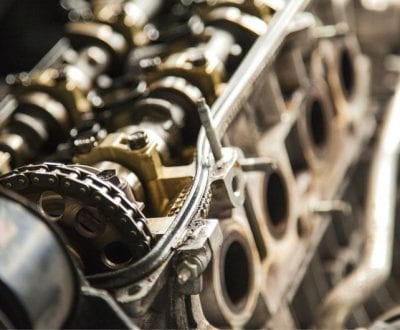

Approved Engine course 1 (AEC1)

Approved Engine course 2 (AEC2)
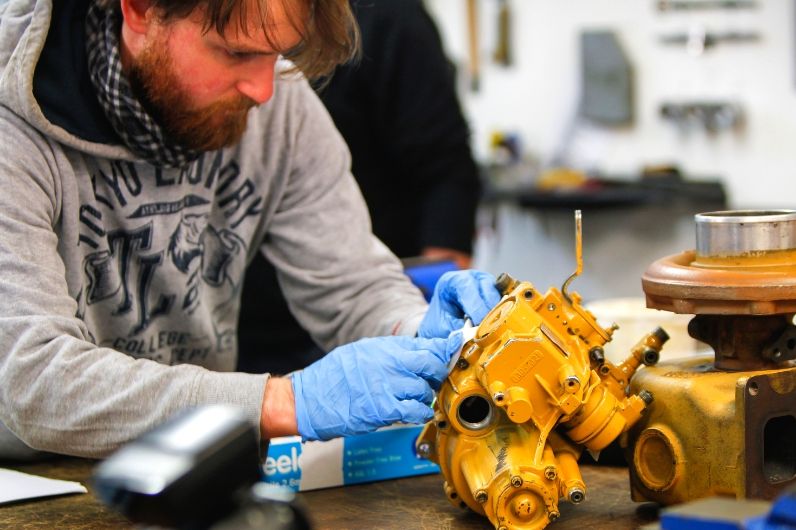
Yachting Engineering programmes
Our Yacht Engineering courses will give you the internationally recognised skills and qualifications you need to start your career as a yacht engineer, providing an understanding of engineering disciplines, as well as the hands-on skills you’ll need.
Our programmes include:
- RYA Diesel Engine Maintenance – an introduction to maintaining diesel engines and diagnosing basic faults.
- Approved Engine Course 1 (AEC1) – the next step in hands-on training and theoretical knowledge of diesel engines.
- Approved Engine Course 2 (AEC2) – leading on from the AEC1, providing practical hands on training and theoretical learning across a range of auxiliary systems.
For full details of UK requirements for engineer officers on Small Vessels please see MIN 524 (M+F).
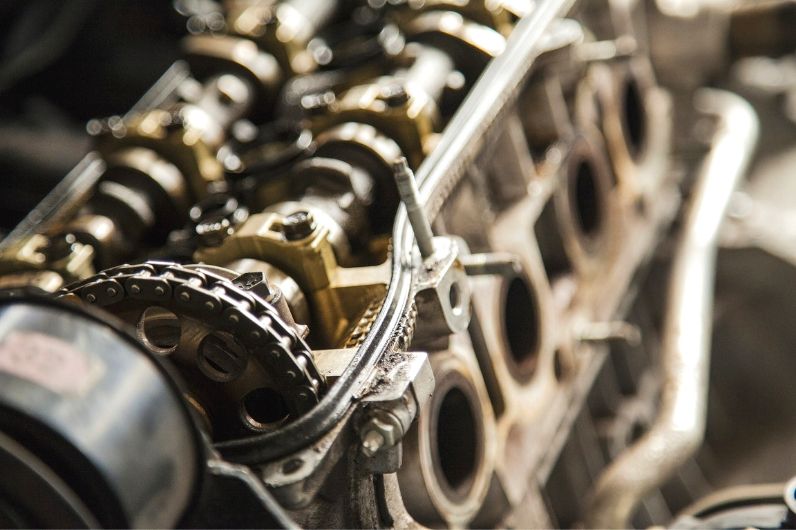
Expert yacht engineering training
Delivered by qualified yacht engineers and taught in our purpose-built training workshops, our professional Yacht Engineering courses give you the skills and knowledge you need to build an engineering career at sea.
Where can these courses take me?
Allowing you to gain the internationally recognised skills and MCA qualifications for a rewarding career as an engineering officer, we offer the courses needed to progress from an assistant engineer to a chief engineer on modern superyachts.
Alongside these specific engineering courses you may also need the STCW Basic Safety Training if you are looking for a career onboard vessels above 24 meters.
Share your #SeaChangeStories
You can share your #SeaChangeStories across social media, please email us with your story and remember to send us your photos too.
Our flexible training works around your busy schedule.
Speak to an advisor on +44 (0)1983 203001 or email us

- Charter & Brokerage
- Yacht Design & New Builds
- Tenders & Toys
- Superyacht Events Calendar
- Career & Training
- Departments
- Superyacht Crew Finances
- Sustainability
- Shipyards and Marinas
- Health & Wellbeing
- Polar Region
- Our Services
- Meet the Team
How to Become A Yacht Engineer
.png)
Are you looking for a career as a yacht engineer?
Wilsonhalligan have compiled a breakdown of the qualifications and requirements needed to start out as a yacht engineer. As well as insight into the job day-to-day and how to effectively land your dream position.
What does a Yacht Engineer do?
It depends on the type, size and usage of the yacht. But, the Engineering department are responsible for the operation, maintenance and repair of all:
- electricals
- electronics
- as well as in some cases, structural systems and appendages found on board a modern yacht and superyacht.
Skills needed to be a successful Yacht Engineer:
The role requires a keen eye for planning and organisation. Planned maintenance (carrying out preventative and explorative maintenance before failures occur) is a very important aspect in modern marine engineering. Skills in project management, resource allocation and time management are very desirable, in addition to extensive and diverse technical ability. Many yachts employ software programmers to aid a methodical approach to planned and preventative maintenance, as well as to record failures and repairs as they occur. As well as keeping an accurate inventory of spares held on board. Being able to efficiently use such software programs efficiently would be highly advantageous. Examples of these asset management programs are AMOS and IDEA .
Challenges as an Engineer Onboard a Yacht:
Engineering on a superyacht has particular challenges. Some yachts (particularly charter yachts) can be very busy, meaning a very fast paced and demanding environment. High expectations from owners and guests in regards to service and entertainment also puts a keen onus on engineering departments. They are expected to keep all systems working to minimise or eliminate down time and negative impacts on the itinerary. Of course, when the yacht is at sea, many of these systems are safety critical. Break downs and failures offshore bring a whole new set of challenges and risks.
Which qualifications do I need to get in to Superyacht engineering?
There are really two main entry routes in to yacht and superyacht engineering. They follow two distinct certification pathways – entering from commercial shipping, or working through yacht-based certification routes.
Firstly, the Commercial Shipping Route of Training for Yacht Engineering:
The Commercial Shipping route most commonly begins with a sponsored cadetship with a shipping company. Who, are working in partnership with maritime training providers. Candidates must apply to one of a number of cadetship schemes. And, if accepted will undertake usually 3 years of study and work experience on the sponsoring companies’ vessels. Culminating very often in the Officer of the Watch (Engineering) or ‘EOOW’ ticket. And, usually either an HND or BSc Degree in Marine Engineering or similar.
Once the EOOW certificate is in hand, candidates can be considered suitably qualified. As well as experienced for junior engineering officer roles on large yachts. A common first yachting job for EOOW qualified candidates is 3 rd Engineer. The main advantage of a cadetship is that seatime is gained quickly and on vessels over 3000 GT. It also allows for a ticket which is ‘unlimited’ by tonnage as all yacht engineering certificates are. This opens the door to working on the world’s largest mega and superyachts.
Also, the sponsoring company pays for all courses and examinations which would be extremely expensive if self-sponsored. And, very often a small training bursary is paid on top (some as much as €11,000 / year). The biggest disadvantage is that candidates will have to commit to different types of vessels during the cadetship. These are likely to be chemical tankers or containerships. But most of the large luxury cruise ship companies also offer cadetships. Which, is in some ways closer to the yachting industry. One facilitator of maritime cadetships is the Warsash Maritime Academy – see here .
Secondly, the Yacht Certification Route of Training for Engineering:
This route is made up of 6 key certificates:
The Approved Engine Course (AEC). Often seen as the base-minimum for superyacht engineers who wish to work on yachts over 24m LOA. Usually a 4-day course covering the theory of compression-ignition (diesel) engines and includes a large amount of practical workshops. View the full syllabus for the Approved Engine Course (AEC) . One common provider of AEC courses is Bluewater Yachting in Antibes – see here .
The Marine Engine Operators Licence (MEOL). This is the first certificate in the yacht route that requires sea service, specific shore based learning and an oral exam. View further details on MSN 1859 here .
Y4 Engineer. The first of what is commonly referred to as the ‘Y Tickets’. Y4 allows engineers to work as Chief Engineer on yachts between 200 and 500GT. And, up to 1500Kw in propulsive power.
Y3 Engineer. Allows engineers to work as Chief Engineer on yachts up to 3000GT and up to 3000KW in propulsive power.
Y2 Engineer. Allows engineers to work as Chief Engineer on yachts up to 3000GT and up to 6000KW in propulsive power.
Y1 Engineer. Allows engineers to work as Chief Engineer on yachts up to 3000GT and up to 9000KW in propulsive power.
The Maritime and Coastguard Agency have simplified the Y ticket structure however, and page 19 of MIN 524 provides a simple conversion table from Y tickets to the new standard – Small Vessel (or SV) tickets.
Some course providers are now offering yachting cadetships – one example is this one provided by the UKSA in Cowes on the Isle of Wight .
How To Find a Job as a Superyacht Engineer
Once you have the relevant qualifications, then comes the time to start looking for your first position. Of course, word of mouth and personal connections made through training are a fantastic way to gain knowledge on current positions available however, also consider the following:
Dockwalking – travel to one of the main Superyacht hubs like Palma, Antibes or La Ciotat and walk the docks asking yachts if they need engineering crew. You should take a proper CV , references , and make sure you are well – presented. Be polite and prepare yourself for some face-to-face rejection . However, don ‘ t take things personally .
Use a reputable crew agent such as wilsonhalligan who are MLC 2006 compliant, vastly experienced and a well respected crew recruitment agency in the industry who does the dock walking for you!
We hope you find this helpful! And, we wish you luck on all your career endeavours.
Check out the latest yacht crew jobs available with wilsonhalligan. also, like their facebook page where they post featured yacht engineer jobs as well as the latest jobs available..
For the latest Superyacht Content career and training news, click here.
Wilsonhalligan
Related articles, the crew network – top jobs this week, international women’s day 2024: hearing from the women in the superyacht industry, private or charter. which is best for you, a deckhand’s guide for tender driving experience.

Popular Posts
- Best Local Spots To Refresh During Palma International Boat Show
- Best And Worst Times To Find Yacht Crew Jobs (Fort Lauderdale)
- Floatist: Strategic Partnership Will Transform The Croatian Charter Market
- The Best Superyacht Marinas In New Zealand For Yacht Crew
- Q&A With Yachties Run Wild & Building Women’s Fitness Community In Palma
Superyacht Content
Social media influencer and digital brand expert.
Superyacht Content brings you the latest in social news for the superyacht industry.
Keep up to date with us across our social channels, and don’t forget to hit that share button!
- Superyacht News
- Superyacht Jobs
- Superyacht Marketing
Join our Newsletter
- Your Name First Last
- Your Email *
Copyright © 2023 Superyacht Content | Website Design by Zonkey
Privacy | Credits | Get in Touch
How Do I Become A Yacht Engineer – Qualifications and Requirements
If you are looking for a career as a yacht engineer, we’ve compiled a breakdown of the qualifications and requirements needed to start out, insight into the job day-to-day and how to effectively land your dream position.
What Does a Yacht Engineer do?
Depending on type, size and usage of the yacht, the Engineering department (be that a Sole Engineer or a department of 6 or more Engineers) are responsible for the operation, maintenance and repair of all mechanical, electrical, electronic, hydraulic, pneumatic and in some cases, structural systems and appendages found on board a modern yacht and superyacht.
Skills Needed to be a Successful Yacht Engineer
The role requires a keen eye for planning and organisation, as planned maintenance (carrying out preventative and explorative maintenance before failures occur) is a very important aspect in modern marine engineering. Skills in project management, resource allocation and time management are very desirable in addition to extensive and diverse technical ability. Many yachts employ software programs to aid a methodical approach to planned and preventative maintenance and to record failures and repairs as they occur as well as keeping an accurate inventory of spares held on board. Being able to efficiently use such software programs efficiently would be highly advantageous. Examples of these asset management programs are AMOS and IDEA .
Challenges as an Engineer Onboard a Yacht
Engineering on a superyacht has particular challenges as some yachts (particularly charter yachts) can be very busy, meaning a very fast paced and demanding environment. High expectations from owners and guests in regards to service and entertainment also puts a keen onus on engineering departments to keep all systems working to minimise or eliminate down time and negative impacts on the itinerary. Of course, when the yacht is at sea, many of these systems are safety critical and break downs and failures offshore bring a whole new set of challenges and risks.
Which qualifications do I need to get in to superyacht engineering?
There are really two main entry routes in to yacht and superyacht engineering which follow two distinct certification pathways – entering from commercial shipping, or working through yacht-based certification routes.
Commercial Shipping Route of Training for Yacht Engineering
The Commercial Shipping route most commonly begins with a sponsored cadetship with a shipping company working in partnership with maritime training provider. Candidates must apply to one of a number of cadetship schemes and if accepted will undertake usually 3 years of study and work experience on the sponsoring companies’ vessels, culminating very often in the Officer of the Watch (Engineering) or ‘EOOW’ ticket and usually either an HND or BSc Degree in Marine Engineering or similar.
Once the EOOW certificate is in hand, candidates can be considered suitably qualified and experienced for junior engineering officer roles on large yachts. A common first yachting job for EOOW qualified candidates is 3 rd Engineer. The main advantage of a cadetship is that seatime is gained quickly and on vessels over 3000 GT, allows for a ticket which is ‘unlimited’ by tonnage as all yacht engineering certificates are. This opens the door to working on the world’s largest mega and superyachts.
Also, the sponsoring company pays for all courses and examinations which would be extremely expensive if self-sponsored, and very often a small training bursary is paid on top (some as much as €11,000 / year). The biggest disadvantage is that candidates who ultimately want to work on superyachts will have to commit to different types of vessel for the duration of the cadetship – these are likely to be chemical tankers or containerships, but most of the large luxury cruise ship companies also offer cadetships which is in some ways closer to the yachting industry. One facilitator of maritime cadetships is the Warsash Maritime Academy – see here .
Yacht Certification Route of Training for Engineering
This route is made up of 6 key certificates:
The Approved Engine Course (AEC) – often seen as the base-minimum for superyacht engineers who wish to work on yachts over 24m LOA. Usually a 4-day course covering the theory of compression-ignition (diesel) engines and includes a large amount of practical workshops. View the full syllabus for the Approved Engine Course (AEC) . One common provider of AEC courses is Bluewater Yachting in Antibes – see here .
The Marine Engine Operators Licence (MEOL) – This is the first certificate in the yacht route that requires sea service, specific shore based learning and an oral exam. View further details on MSN 1859 here .
Y4 Engineer – The first of what is commonly referred to as the ‘Y Tickets’ – Y4 allows engineers to work as Chief Engineer on yachts between 200 and 500GT and up to 1500Kw in propulsive power.
Y3 Engineer – Allows engineers to work as Chief Engineer on yachts up to 3000GT and up to 3000KW in propulsive power.
Y2 Engineer – Allows engineers to work as Chief Engineer on yachts up to 3000GT and up to 6000KW in propulsive power.
Y1 Engineer – Allows engineers to work as Chief Engineer on yachts up to 3000GT and up to 9000KW in propulsive power.
The Maritime and Coastguard Agency have simplified the Y ticket structure however, and page 19 of MIN 524 provides a simple conversion table from Y tickets to the new standard – Small Vessel (or SV) tickets.
Some course providers are now offering yachting cadetships – one example is this one provided by the UKSA in Cowes on the Isle of Wight .
How are Engineering Departments Structured on Yachts?
Engineering departments vary widely according to the type, size and usage of the yacht in question, but most large yachts will have some or all of the following roles on board:
Chief Engineer (or Sole Engineer on smaller yachts with only one engineer) The Chief Engineer is in overall command of all Engineering operations on board and is the senior advisor to the Captain on all matters related to the condition and serviceability of the yachts engines, propulsion, ancillaries and hotel systems. Although Captains always retain supreme responsibility for the safety of the vessel, all the best captains will work very closely with the Chief Engineer and take heed of any advice and requests they make – after all, they are highly trained, experienced and knowledgeable subject matter experts. Chief Engineers are responsible for ensuring that the Yacht is in all respects compliant with the relevant laws and regulations governing the serviceability of the yachts systems and equipment. They are pivotal in ensuring the yacht passes any relevant flag state, port state or P&I club surveys and inspections.
1 st Engineer Some of the very largest yachts afloat employ a 1 st Engineer similar to those employed on Cruise Ships. If a 1 st Engineer is employed, they will take operational (day-to-day) command of the engineering team, supervising engineering tasks and allocating work as appropriate. This allows the Chief Engineer to concentrate on the large amount of paperwork and business management necessary on board a very large yacht.
2 nd Engineer The more common understudy to the Chief Engineer, the 2 nd Engineer often has responsibility for Engine Room maintenance and will take on many of the more challenging maintenance and repair tasks as required. The 2 nd Engineer acts as a supervisor for more junior crew, and in some cases will be able to deputise for the Chief Engineer if required.
3 rd Engineer The 3 rd Engineer will have specific duties, which may include maintenance of the ship’s lifeboats, tenders, jet skis, toys and deck equipment like winches, davits and hatchways. Very often 3 rd s are responsible for interior maintenance. Again, areas of responsibility vary from yacht to yacht. 3 rd Engineers are often focused on gaining the requisite experience and ‘seatime’ to progress to 2 nd Engineer.
4 th Engineer The most junior engineering officer on board, the 4 th is very often new to Marine Engineering and is learning the trade. 4 th Engineers are often engaged in structured learning programs, or at least splitting their time between phases at sea learning on the job with phases ashore attending courses. Again, this can vary widely across the industry.
Motorman A junior, but important role found almost exclusively on large yachts in excess of around 100m, the motorman (not gender-specific!) is responsible for the operation and basic maintenance of the yachts main engines and engine room systems. They may assist in starting and stopping large engines and generators, operating switch panels under the supervision of an officer or senior engineer and reporting anything unusual. Engine room cleanliness and order will be an important part of the role.
Wiper / Oiler On the largest yachts, especially those operating medium speed diesels or older conventional ship propulsion technology, a wiper and oiler may be employed in addition to the above with a focused role keeping engines and machinery spaces clean, and keeping greased bearings fed or keeping open rockers oiled etc. An ability to access confined spaces is often useful, and a keen eye for cleanliness in bilges and bunded tanks etc is often a must.
How To Find a Job as a Superyacht Engineer
Once you have the relevant qualifications, then comes the time to start looking for your first position. Of course, word of mouth and personal connections made through training are a fantastic way to gain knowledge on current positions available however, also consider the following:
Dockwalking – travel to one of the main superyacht hubs like Palma, Antibes or La Ciotet and walk the docks asking yachts if they need engineering crew. Make sure you take a proper CV, written references and go well presented. Be polite and be prepared for a good deal of face-to-face rejection, however don’t take it personally.
Use a reputable crew agent such as wilsonhalligan who is MLC 2006 compliant, vastly experienced and a well respected crew recruitment agency in the industry who does the dock walking for you!
We’re here to help
Elan House, 5a Little Park Farm Road, Fareham, Hampshire PO15 5SJ
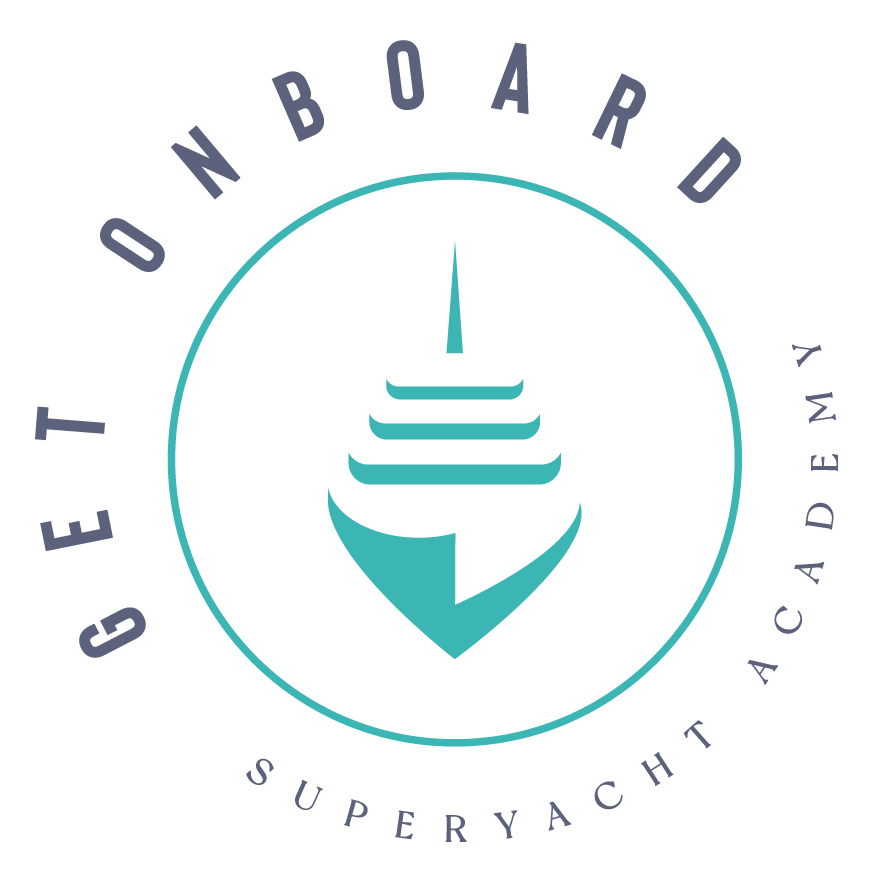
Get Onboard
Superyacht Training
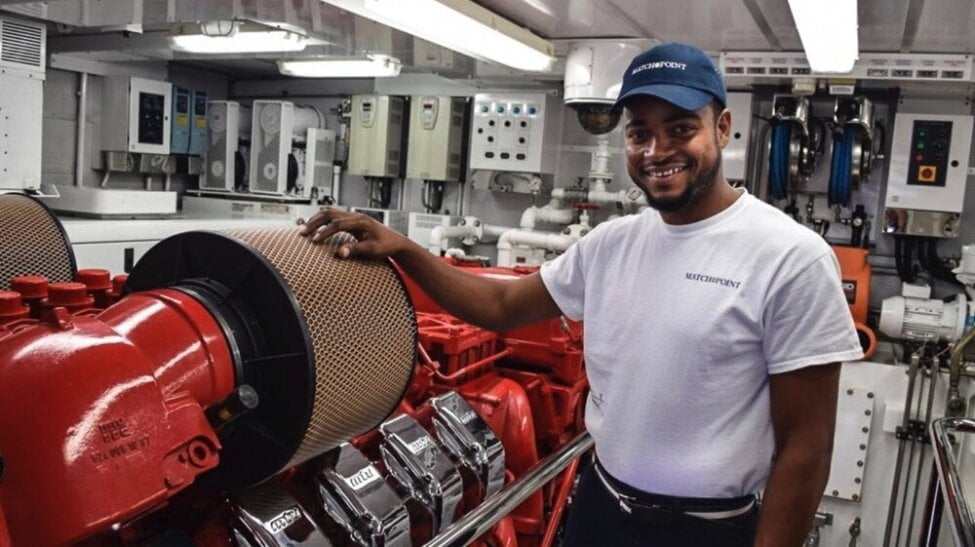
How To Become A Superyacht Engineer
Thinking about pursuing a career as a superyacht engineer we show you how….
We frequently receive emails from students asking us, “How do I become a Superyacht Engineer?” “Are my trade skills transferable?” “What yacht training must I complete?” and “ What qualifi cations do I need? “. In this article, we break down these questions and explain exactly what steps you need to follow in order to become a super yacht engineer.
What is a Superyacht Engineer?
The crucial part of any yacht engineer job description is maintaining the mechanical and electrical operations of the yacht. The duties of an engineer range from maintaining and servicing generators, jet skis and powerboats to replacing oil filters, repairing water makers, monitoring air conditioning, AV, IT and even unblocking toilets. Whether you are new to the industry, or have worked on land as a plumber, carpenter or tradesman, anyone can become a super yacht engineer, provided they have completed the necessary courses.
The Engineering Department onboard a super yacht is quickly becoming one of the most desirable departments to work due to the rotation packages as well as the transferable skills land-based skills such as plumbing and carpentry . Senior Engineers are highly respected and are of a similar rank to the Captain as the yacht is unable to manoeuvre without them.
What are the Superyacht Engineering Courses and Qualifications?
Yacht engineering qualifications were introduced in February 2001 to provide an industry standard system of certification. The system allows all those who wish to pursue engineering careers to do so, no matter what their previous training is.
The Maritime and Coastguard Agency (MCA), have set out the basic course progression you will need to follow in order to work your way up from a Junior Engineer, to Chief Engineer onboard. This involves completing the AEC , MEOL and Yacht 4, 3, 2 and 1 qualifications.
The qualifications you require include:
A mechanical, diesel or electrical background
Strong project management skills
Inventory maintenance experience
Understanding of different softwares
The Approved Engine Course (AEC) – the base minimum for superyacht engineers who wish to work on yachts over 24m LOA
The Marine Engine Operators Licence (MEOL)
Depending on the size of yacht you want to work on, you may need the following licenses.
– Yachts <200GT with up to 1500Kw in propulsive power:
Small Vessel Second Engineer (formerly Y4)
– Yachts <500GT with up to 3000Kw in propulsive power:
Small Vessel Chief Engineer (formerly Y3)
– Yachts <3000GT with up to 9000Kw in propulsive power:
Small Vessel Chief Engineer (formerly Y1/2)
or Officer of the Watch (Engineering) – usually gained from the commercial shipping industry
– Unlimited license:
Engineer Officer of the Watch – Unlimited
What is a typical yacht engineer salary?
Starting out as a 3rd or junior engineer, you can expect to earn anywhere from $3,000 to $6,500 per month, and as you move up the ranks to 2nd engineer this increases from $5,000 to $8,000.
In the top position, a chief yacht engineer salary can be anywhere between $8,500 to $13,500, depending on the size of the yacht, so if you want the big bucks then the engineering department is the way forward!
There is no average yacht engineer salary, with roles varying so much from yacht to yacht, however these figures are a guideline for what you can expect to earn. It is worth noting that obtaining your engineering qualifications takes time and is an expensive process, so be sure you are ready to commit to long hours of studying ahead. Check out our article on yachting salaries for more information.
What are the super yacht training package do you offer?
Once you have completed your STCW course and other basic safety training, you can look to expand your skill set to work on board in the super yacht industry.
We have put together an extensive Superyacht Engineering training program which is an ideal entry level introduction for those seeking to work on a yacht as an Engineer. Due to the longevity of the engineering department onboard, this is an excellent avenue to explore if you are looking for real career progression, rather than a gap year experience.
- Proficiency in Designated Security Duties (PDSD)
- RYA Powerboat Level 2
MCA Approved Engine Course (AEC1)
Interested in learning more?
If you are thinking about starting out as an engineer, you can read more about our Superyacht Engineer Course package.
You can complete these courses with us at Get Onboard Superyacht Academy in Cape Town. If you are interested in learning more, why not speak to one of our expert consultants who will happily answer any additional questions you may have.
Needing more?
Error: Contact form not found.
RYA/MCA Online
1. what are the basic requirements you need to be eligible to work in the yachting industry, 2. what is the stcw and why do i need it, 3. what is the eng1 medical certificate, 4. what land based experience will help me find a super yacht job, 5. what are the different departments onboard, 6. what crew training is required for me to work as a junior deckhand.
- Yachtmaster/Coastal Skipper Theory
- Yachtmaster/Coastal Practical
- Specialist Super Yacht Training Course (Deck Hand Training Course)
- RYA Power Boat Level II
- RYA Personal Watercraft Course
- RYA Competent Crew Certificate
- RYA Day Skipper Theory and Practical Certificates
- VHF Radio Operator’s License
7. What crew training is required for me to work as a junior stewardess?
- Stewardess Course
- MCA Food Safety Level 2
8. How do I book my training courses?
9. how do i get my first job on a yacht, 10. are these courses worth it, or am i just wasting my money, 11. will i get hired for my first job from south africa, 12. what is daywork, 13. what are the best locations to get a yacht job, 14. how much can a motor yacht stewardess or deckhand earn, 15. what are the negatives of working on a yacht, 16. what are the positives of working on a yacht, 17. is working on a super yacht for everyone, 18. what is the minimum age to work on a yacht, 19. is accommodation provided when i am completing my yacht training in cape town.

10 Best Yacht Engineering Courses: Mastering Yacht Engineering!
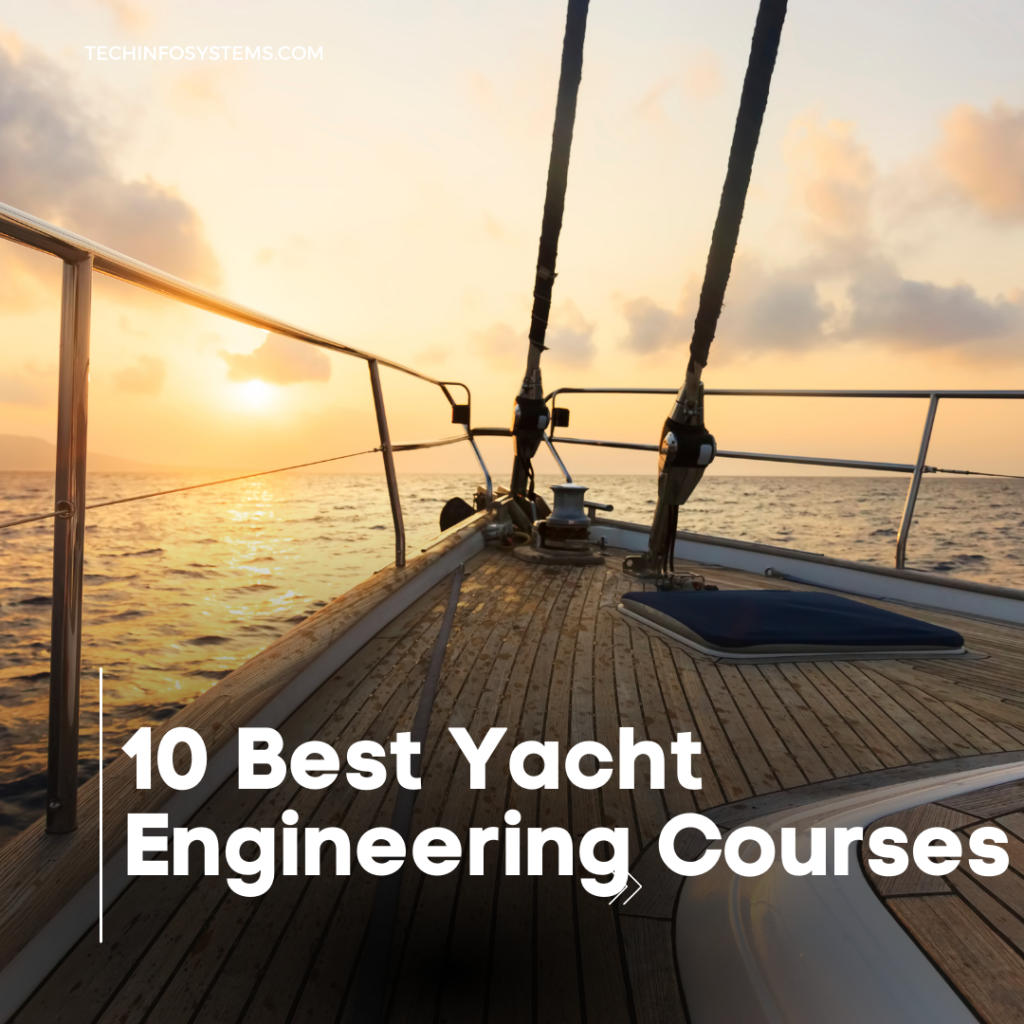
Are you ready to navigate the exciting world of yacht engineering? Buckle up, because we’re about to embark on a thrilling voyage through the best yacht engineering courses out there! Ever dreamt of becoming a yacht engineer, mastering the art of marine technology, and setting sail on a career filled with adventure and innovation? Well, you’re in the right place! In this guide, we’ll steer you towards the most comprehensive, engaging, and rewarding yacht engineering courses available. Get ready to transform your passion for yachts into a skill set that sets you apart in the maritime world. Ahoy, future yacht engineers – your journey starts here!
What Are the Best Yacht Engineering Courses?
If you’re seeking the best yacht engineering courses , look no further! We’ve scoured the seas of online education to bring you a curated list of top-notch options. From Marine Engineering Diplomas to specialized training in diesel generator engineering, these courses are tailored to enthusiasts and professionals alike. Dive into the intricacies of yacht construction, engine systems, and maritime technology. Whether you’re a newcomer or a seasoned sailor, these courses will chart your course towards expertise in yacht engineering. Ready to raise your anchor and set sail on this educational odyssey? Let’s explore the best yacht engineering courses that will steer your career to new horizons!
1. Marine Engineering Diploma

The Marine Engineering Diploma course on Udemy delivers a comprehensive exploration of marine engineering, covering ship design, construction, operation, and maintenance of marine equipment. Designed for enthusiasts and aspiring professionals, this course dives deep into marine science, engineering thermodynamics, and marine electrical systems, providing essential knowledge for yacht engineering.
- Understand ship structure, marine engines, and electrical equipment.
- Expert instruction by Omar Abed, a highly-rated instructor with extensive expertise.
- Detailed insights into marine engineering principles and thermodynamics.
- Access to lifetime course materials and a free downloadable book.
- 30-Day Money-Back Guarantee ensures satisfaction.
Course Price: $13.99 (77% off original price of $59.99)
Explore Pricing and Enroll Now!
Embark on a rewarding journey into yacht engineering with the Marine Engineering Diploma course . Gain in-depth knowledge of marine engineering principles and practical skills essential for yacht construction and maintenance. Don’t miss this opportunity to enhance your expertise and explore exciting career prospects in the yacht engineering industry. Enroll now and set sail towards a successful future in yacht engineering courses .
2. Become A Diesel Generator Engineer- In just 6.5 Hours !

Dive into the world of diesel generator engineering with the ‘Become A Diesel Generator Engineer’ course on Udemy. In just 6.5 hours, gain a comprehensive understanding of mechanical, electrical, and logical aspects of diesel generators. From installation basics to in-depth insights into engine components, electrical systems, and control panels, this course equips you with the knowledge needed for handling generators with confidence.
- Comprehensive coverage of diesel generator engineering, including mechanical, electrical, and logical aspects.
- Detailed understanding of installation basics, engine assembly, exhaust systems, electrical load testing, and more.
- Expert instruction by George Gajinder Singh, with a 4.2 instructor rating based on 297 reviews.
- Real-world insights from professionals, enhancing practical knowledge.
- Gain confidence in handling sudden breakdowns and daily generator operations.
Explore the intricacies of diesel generator engineering in just 6.5 hours. Acquire practical skills and knowledge that empower you to handle generators confidently in real-world scenarios. With a 30-Day Money-Back Guarantee, there’s no risk in expanding your expertise. Don’t miss this opportunity to excel in the field of diesel generator engineering. Enroll now and elevate your skills with this comprehensive course .
3. Mechanical Engineers-Your Role in EPC of Process Plants

Explore your potential in the realm of Process Plant Engineering, Procurement & Construction (EPC) projects with ‘Mechanical Engineers-Your Role in EPC of Process Plants.’ This course , led by industry expert Chandrasekaran Tanjore Naganath, offers a deep dive into the role of Mechanical Engineers in chemical projects. Discover the specific knowledge, software skills, and interdisciplinary collaborations required for successful design and construction engineering in EPC companies executing Chemical Projects.”
- Insightful guidance on Mechanical Engineers’ opportunities and roles in Chemical projects within the EPC context.
- Understanding of specific knowledge and software skills vital for design and construction engineering in EPC companies.
- Detailed exploration of Mechanical Engineers’ involvement with various disciplines, enhancing their versatility.
- Real-world examples and case studies illustrating the importance of Mechanical Engineers in every project stage.
- Ideal for fresh graduates and engineers new to the field, offering clarity on role responsibilities.
Course Price: $13.99 (69% off original price of $44.99)
Aspiring Mechanical Engineers, enhance your career prospects in EPC projects with this insightful course . Gain valuable insights into your pivotal role within the chemical project landscape, empowering you to excel in this dynamic field. With a 30-Day Money-Back Guarantee, seize the opportunity to expand your knowledge and confidence. Don’t miss out; enroll today and step into a fulfilling career in Process Plant Engineering.
4. Fundamentals of Internal Combustion Engines – IC Engines

“Dive into the heart of automotive engineering with ‘Fundamentals of Internal Combustion Engines – IC Engines’ on Udemy. Taught by Prof. Samer, this course equips students with a profound understanding of car engines, covering everything from basic engine geometry to intricate performance calculations. With clear explanations, engaging animations, and comprehensive content, this course is ideal for engineering enthusiasts and professionals looking to master the intricacies of internal combustion engines.
- In-depth coverage of engine geometry, performance parameters, and kinematics.
- Detailed explanations of Four-Stroke and Two-Stroke Engines, empowering students to comprehend engine workings thoroughly.
- Application of engineering principles to analyze engine performance under various conditions.
- Real-life examples and exercises to reinforce learning and practical application.
- Access to exercise files for hands-on practice and enhanced understanding.
Course Price: $13.99 (75% off original price of $54.99)
For engineering enthusiasts and professionals seeking mastery in internal combustion engines, this course is a must. Prof. Samer’s engaging teaching style and comprehensive curriculum provide a strong foundation in automotive engineering. With a 30-Day Money-Back Guarantee, seize this opportunity to delve deep into the world of car engines. Enroll now and elevate your understanding of internal combustion engines to new heights. Don’t miss out; start your learning journey today.
5. Advanced Internal Combustion Engine Analysis and Design

Master the complexities of internal combustion engines with the ‘Advanced Internal Combustion Engine Analysis and Design’ course by OZIS Academy on Udemy. Ideal for engineers and automotive enthusiasts, this course delves deep into IC engine design , operation, and environmental impact. Explore fundamental concepts, combustion processes, emissions control, and more. With in-depth lectures and practical insights, this course empowers learners to optimize engine performance and efficiency.”
- Comprehensive coverage of IC engine fundamentals, including combustion processes, emissions control, and lubrication systems.
- Practical insights into engine performance optimization and environmental impact reduction.
- Detailed exploration of carburetors, mechanical injection systems, combustion chambers, and engine cooling systems.
- Real-life examples and case studies for practical understanding.
- Suitable for both engineering professionals and enthusiasts aspiring to excel in the automotive industry.
Elevate your expertise in internal combustion engines with OZIS Academy’s comprehensive course . Perfect for engineering professionals and enthusiasts, this course provides a deep understanding of IC engine design and operation, along with practical insights into emissions control and efficiency optimization. With a 30-Day Money-Back Guarantee, this is a risk-free opportunity to enhance your skills and advance your career in the automotive industry. Don’t miss out; enroll today and unlock the secrets of advanced IC engine analysis and design.
6. Maritime 4.0 – The Maritime Industry in Industry 4.0

Dive into the future of maritime technology with ‘Maritime 4.0 – The Maritime Industry in Industry 4.0,’ an illuminating course by Deshan Kuruvita-Aratchy, Founder, and CEO of CipherDev Labs™. Discover the intricacies of the Maritime Industry and its evolution into Industry 4.0. Explore key insights, challenges, and innovative opportunities, unraveling the impact of Cyber Physical Systems and Industry 4.0 on maritime operations. Perfect for tech enthusiasts and industry professionals keen on understanding the cutting-edge trends reshaping maritime landscapes.”
- In-depth exploration of the Maritime Industry, its challenges, and pivotal opportunities for innovation.
- Insightful coverage of Industry 4.0 concepts, including Cyber Physical Systems (CPS) and their impact on maritime operations.
- Comprehensive understanding of the evolution of industrial revolutions leading up to Industry 4.0.
- Real-world examples showcasing innovative startups and businesses within the Maritime Industry.
- Engaging discussions on the barriers and drivers of implementing Industry 4.0 in maritime contexts.
Course Price: $13.99 (30% off original price of $19.99)
Stay ahead in the maritime industry by exploring the convergence of technology and maritime operations in the Industry 4.0 era. ‘Maritime 4.0’ is your gateway to understanding the challenges, innovations, and transformations shaping the future of maritime technology. With a 30-Day Money-Back Guarantee, this course offers a risk-free opportunity to grasp the dynamics of Maritime 4.0. Don’t miss out; enroll now and navigate the future of maritime technology with confidence. Start your learning journey today.
7. Marine SRC Course Prep.

“Prepare for your Marine Short Range Certification (SRC) course with confidence through ‘Marine SRC Course Prep. – Marine VHF for SRC.’ Led by Dylan Kemlo, a seasoned expert in Two-way Radio Communication Training, this course equips you with theoretical and practical knowledge essential for SRC success. Dive into marine radio telephony communications, understand VHF communication nuances, and enhance your skills in this comprehensive course designed to set you on the path to SRC certification.”
- Tailored preparation for the Marine Short Range Certification (SRC) course.
- Detailed insights into SRC certification content, radio functions, sub-systems, procedures, and communications.
- Engaging presentation style with downloadable materials for in-depth understanding.
- Practical examples and orientation to marine VHF terminology and phrases.
- Relaxed and easy-to-follow instruction style suitable for newcomers and those seeking a refresher.
Course Price: $13.99 (60% off original price of $34.99)
Prepare effectively for your Marine Short Range Certification (SRC) course with ‘Marine SRC Course Prep. – Marine VHF for SRC.’ Dylan Kemlo’s comprehensive approach and engaging teaching style make learning marine radio communications accessible and enjoyable. With a 30-Day Money-Back Guarantee, this course offers a risk-free opportunity to enhance your knowledge and readiness for the SRC certification . Don’t miss this chance to boost your skills and confidence in marine VHF communications. Enroll now and embark on your journey toward SRC success. Start your preparation today.
8. Reciprocating Compressors: Principles , Operation & Design

Master the intricacies of Reciprocating Compressors with the comprehensive course “Reciprocating Compressors: Principles, Operation & Design” by WR Training, renowned experts in Petroleum, Petrochemical & Chemical Engineering. With an impressive 4.5 instructor rating and over 11,768 positive reviews, this course is designed to provide a deep understanding of compressor construction , operation, and design. Delve into essential topics such as gas compression, pulsation control, and capacity management, equipping yourself with invaluable knowledge for successful plant operation and maintenance .
- In-Depth Learning: Understand the working principles, construction details, and performance calculations of reciprocating compressors.
- Comprehensive Coverage: Explore various aspects, including compressor valves, pulsation control, and capacity adjustment techniques.
- Real-World Application: Gain practical insights with graphics, 3D animations, and cross-sectional views for a virtual hands-on experience.
- Expert Instruction: Learn from WR Training , experts in Petroleum, Petrochemical & Chemical Engineering, with a stellar reputation in the industry.
- Flexible Learning: Suitable for both beginners and experienced professionals, explained in an easy-to-understand language.
Course Price: $18.99 (80% off original price of $94.99)
Elevate your knowledge of reciprocating compressors with WR Training’s expertise. Whether you’re new to the field or seeking to enhance your skills, this course offers a profound understanding of compressor principles, operation, and design. Take advantage of the 80% discount and enroll today to access lifetime course material. With a 30-Day Money-Back Guarantee, this is your opportunity to advance your engineering expertise and excel in the world of compressors. Don’t miss out—start learning now and unlock a world of possibilities in the realm of reciprocating compressors.
9. Introduction to Hydroelectric Power Plant Engineering

Dive into the fascinating world of hydroelectricity with the course “Introduction to Hydroelectric Power Plant Engineering” by saVRee 3D. With an outstanding instructor rating of 4.6 based on 1,720 reviews, this course offers a comprehensive introduction to hydroelectric power plant design and operation . From understanding the fundamental components to exploring various types of hydro power plants, this course equips you with essential knowledge in the field of power engineering.
- Comprehensive Learning: Gain insights into hydro power plant components, terminology, and different types of hydro power plants.
- Visual Learning: Utilize interactive 3D models and animations to enhance your understanding of complex concepts.
- Expert Instruction: Learn from saVRee 3D, an instructor with a stellar reputation and extensive expertise in power engineering.
- Real-World Relevance: Explore the role of hydroelectricity in today’s power engineering market, bridging theoretical knowledge with practical applications.
Course Price: $19.99
Embark on a learning journey with “Introduction to Hydroelectric Power Plant Engineering” and expand your knowledge of hydroelectricity. This course, enriched with interactive 3D models and animations, provides a comprehensive understanding of hydro power plant components and types. Whether you’re a beginner or seeking to enhance your existing knowledge, this course is designed to cater to learners of all levels. Priced at just $19.99 and backed by a 30-Day Money-Back Guarantee, this is your opportunity to explore the world of hydroelectricity with confidence. Enroll today and unlock the door to a brighter future in power engineering.
10. Diesel Engine Fundamentals (Mechanical Engineering)

Explore the intricacies of diesel engines with the course “Diesel Engine Fundamentals (Mechanical Engineering)” by saVRee 3D. With an impressive instructor rating of 4.6 based on 375 reviews, this course provides a deep dive into the world of reciprocating piston engines. From understanding the evolution of engines to mastering engine components and systems, this course equips you with comprehensive knowledge in mechanical and automotive engineering.
- Comprehensive Learning: Grasp the functioning of diesel engines, including engine components and various systems such as water, oil, air, exhaust, and electrical systems.
- Visual Learning: Benefit from interactive 3D models and animations that enhance your understanding of complex engine processes.
- In-Depth Exploration: Delve into engine terminology, internal combustion engine concepts, and the fundamental differences between petrol/gasoline and diesel engines.
- Expert Instruction: Learn from saVRee 3D, a trusted instructor with a wealth of knowledge in mechanical and automotive engineering.
Course Price: $29.99
Embark on a comprehensive learning journey with “Diesel Engine Fundamentals (Mechanical Engineering)” and expand your understanding of reciprocating piston engines. This course, enriched with interactive 3D models and animations, provides a detailed exploration of engine components and systems. Whether you’re a mechanical engineering enthusiast or aspiring automotive engineer, this course caters to learners of all levels. Priced at just $29.99 and backed by a 30-Day Money-Back Guarantee, this course offers a valuable learning experience . Enroll today and gain a deep understanding of diesel engines with confidence.
What Are Yacht Engineering Courses?
Yacht engineering courses are specialized programs designed to equip enthusiasts and professionals with the essential skills needed to excel in the maritime industry. These courses cover diverse topics such as ship design, marine technology, and engine systems, providing comprehensive knowledge for aspiring yacht engineers. Whether you’re interested in yacht construction or marine electrical systems, these courses offer a deep dive into the world of yacht engineering.
Yacht engineering courses serve as the compass guiding individuals toward a rewarding career in the maritime sector. By enrolling in these programs, aspiring yacht engineers gain valuable expertise in ship design, marine equipment, and engine operations. With a solid foundation in yacht engineering, individuals can confidently set sail into the dynamic and exciting world of marine technology, ensuring a smooth journey toward their professional goals.
What is yacht engineering?
Yacht engineering involves the design, construction, and maintenance of yachts and other marine vessels. It encompasses various disciplines such as naval architecture, marine technology, and mechanical engineering, focusing on creating efficient and safe watercraft.
Who can benefit from yacht engineering courses?
Yacht engineering courses are ideal for aspiring yacht designers, marine engineers, naval architects, and anyone passionate about the maritime industry. These courses cater to individuals seeking a career in yacht construction , maintenance, or related fields.
What topics are covered in yacht engineering courses?
Yacht engineering courses cover a wide range of topics, including ship design principles, marine propulsion systems, electrical systems on boats, hull construction, safety regulations, and maritime technology. Students learn about both theoretical concepts and practical applications.
Are there prerequisites for enrolling in yacht engineering courses?
While some advanced courses may require a background in engineering or a related field, many introductory yacht engineering courses welcome participants with a basic understanding of mathematics and physics. Check the course descriptions for specific prerequisites.
What career opportunities are available after completing yacht engineering courses?
Graduates of yacht engineering courses can pursue careers as yacht designers, marine engineers, shipbuilders, naval architects, marine surveyors, or work in yacht repair and maintenance facilities. They may also find opportunities in maritime research and development.
Is hands-on experience included in yacht engineering courses?
Many yacht engineering courses incorporate practical training , workshops, and simulations to provide students with hands-on experience. This interactive learning approach allows participants to apply theoretical knowledge in real-world scenarios.
Can yacht engineering courses be taken online?
Yes, there are online yacht engineering courses available, allowing students to learn at their own pace from the comfort of their homes. These online platforms offer video lectures, interactive quizzes, and virtual labs to enhance the learning experience.
What certifications can I earn through yacht engineering courses?
Completing yacht engineering courses may lead to certifications recognized by maritime organizations and industry bodies. Common certifications include Marine Engineering Certificates, Yacht Design Diplomas, and Naval Architecture qualifications, depending on the course level and content.
How long does it take to complete a yacht engineering course?
The duration of yacht engineering courses varies, ranging from short-term workshops and certifications lasting a few weeks to comprehensive diploma or degree programs spanning several months or years. The length depends on the course complexity and depth of study.
Are there job placement opportunities after completing yacht engineering courses?
Some yacht engineering courses collaborate with industry partners to offer job placement assistance and internships. Additionally, networking events, career fairs, and alumni connections provided by educational institutions can help students secure employment in the maritime sector.
Similar Posts

10 Best Car Computer Programming Courses: Decoding the Drive!
Are you ready to dive into the fascinating world where rubber meets the digital road? Buckle up, because…

How can medical spa software streamline operations?
In today’s fast-paced world, technology plays a crucial role in transforming businesses across various industries, and the medical…

10 Best Pardot Training Courses: Mastering Pardot!
Are you ready to transform your marketing automation game and become a Pardot virtuoso? Dive into the world…

10 Best Plant Management Courses: Mastering Plant Maintenance!
Are you ready to cultivate your skills in plant management? Imagine navigating the world of industrial flora with…

10 Best CMM Programming Training Courses: Mastering Precision!
Are you ready to elevate your precision game in the world of Coordinate Measuring Machine (CMM) programming? Discover…

10 Best Spiritual Life Coaching Courses: Mindful Living Mastery!
Embark on a cosmic journey to transform your life and others with a touch of enlightenment! 🌟 Dive…
Leave a Reply Cancel reply
Your email address will not be published. Required fields are marked *
Save my name, email, and website in this browser for the next time I comment.

The Quick and Easy Guide to Superyacht Engineering Careers
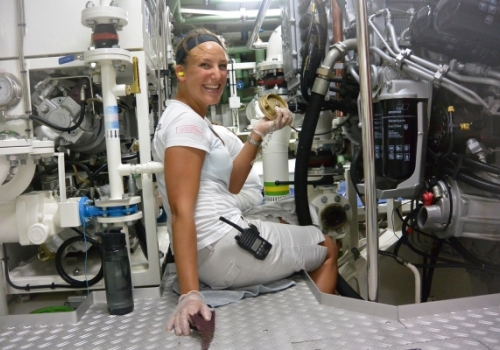
Following on from our guides on superyacht deck and interior careers, it’s time to get our technical hats on and lay out the career pathways for engineering, whether you’re transitioning from another sector or gunning for a chief engineer role.
As always, to keep us on track with the latest training requirements for superyacht engineers, we follow guidance from the experts at the careers guidance platform, Academy by Ephemeris .
What does a superyacht engineer do?
The role of a superyacht engineer varies depending on the size, type and usage of the yacht, and you might be working as a sole engineer, or as part of a team of six or more.
On smaller yachts you will be responsible for the operation, maintenance and repair of all mechanical, electronic, electric, hydraulic, pneumatic systems, and in some instances, also the structural systems and appendages on board.
Notably, on larger yachts there is usually a separation of function between the engineer and the electro-technical officer (ETO) who is responsible for the day-to-day maintenance and operation of all electronic, electrical, communications and audio-visual equipment. This could include radio, radar, telephones, satellite communications (including internet), navigation systems, email servers, TV, sound systems, and security equipment. We will cover how to get ahead on the superyacht ETO careers pathway in our next article.
How do I become a superyacht engineer?
There are two common routes for becoming a superyacht engineer. Firstly, you can enroll in the courses set out by the Maritime and Coastguard Agency (MCA) and work your way through them from the bottom up. These include the Approved Engine Course (AEC), the Marine Engine Operator License (MEOL), and the Yacht 4, 3, 2 and 1 qualifications (with Yacht 4 being the lowest of the four).
Before taking on the Yacht 4 qualification, candidates must already have the MEOL and AEC certificates, or hold an eligible amount of previous experience in another sector first, after which they can progress through the other levels. This is the ideal route if you are totally new to the industry and don’t yet have any practical experience.
The second route to becoming a superyacht engineer involves gaining a relevant qualification, such as a degree in maritime, aerospace or mechanical engineering, before embarking on your yachting career.
The advantage of this option is that you will have a degree under your belt if you decide to change careers later in life. The disadvantage is that it takes longer and will not necessarily offer you any shortcuts in your training to become a superyacht engineer.
What if I already have relevant experience?
If you already have a large amount of sea-service banked, non-yachting certificates or other relevant employment experience, you can apply to the MCA for a Letter of Initial Assessment.
The MCA will then assess the level at which you can enter the yachting certification process, so you can enroll for the relevant engineering courses, oral exams and ancillary courses to progress in your career.
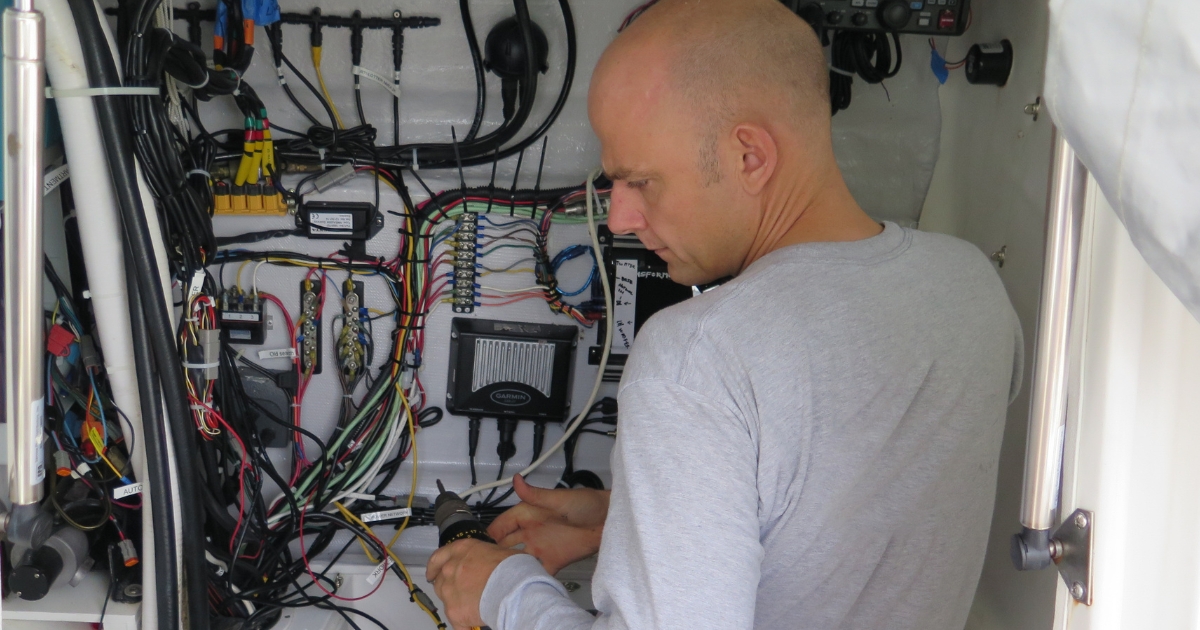
Which entry level qualifications will I need?
As for all crew working on board, to be a superyacht engineer you need to have completed your STCW basic safety training (a five day course) and have a valid ENG1 medical certificate. Assuming you follow the standard route into engineering, once you have both the STCW and ENG1, you will need to complete the AEC 1 and 2.
AEC 1 provides students with basic theoretical knowledge, as well as some practical hands-on experience of diesel engines/systems to enable you to meet the MCA’s requirements. This covers the basic operation of engines and their support systems, as well as checks and fault finding.
You can then progress to the AEC 2 course, which covers topics as diverse as refrigeration, legislation (books and records), maintenance systems and techniques, lifting and slinging, safe systems of work, electrical distribution, basic hydraulic systems, fresh water and sewage systems, and much more.
What are the different roles within the engineering pathway?
Although this varies depending on the needs of the individual vessel, the engineering roles on board a superyacht typically range from fourth engineer through to third, second, first and then chief engineer. The key difference between these positions is found in the level of leadership and management responsibility attributed to each role.
Fourth engineer As the most junior engineering officer on board, the fourth engineer is still learning the ropes, and you will need to demonstrate a willingness to learn and get stuck in straight away in order to succeed in this role. Chances are, you will be splitting your time between phases at sea and phases ashore to attend the courses necessary to progress in your career. Third engineer With responsibilities varying from yacht to yacht, the duties of a third engineer are diverse and could include the maintenance of lifeboats, tenders, toys, jet skis and deck equipment such as winches, davits, and hatchways, as well as interior maintenance. Second engineer Typically the deputy to the chief engineer, the 2nd engineer has responsibility for the maintenance of the engine room, often taking on more challenging repair and maintenance tasks, as well as supervising more junior crew members.
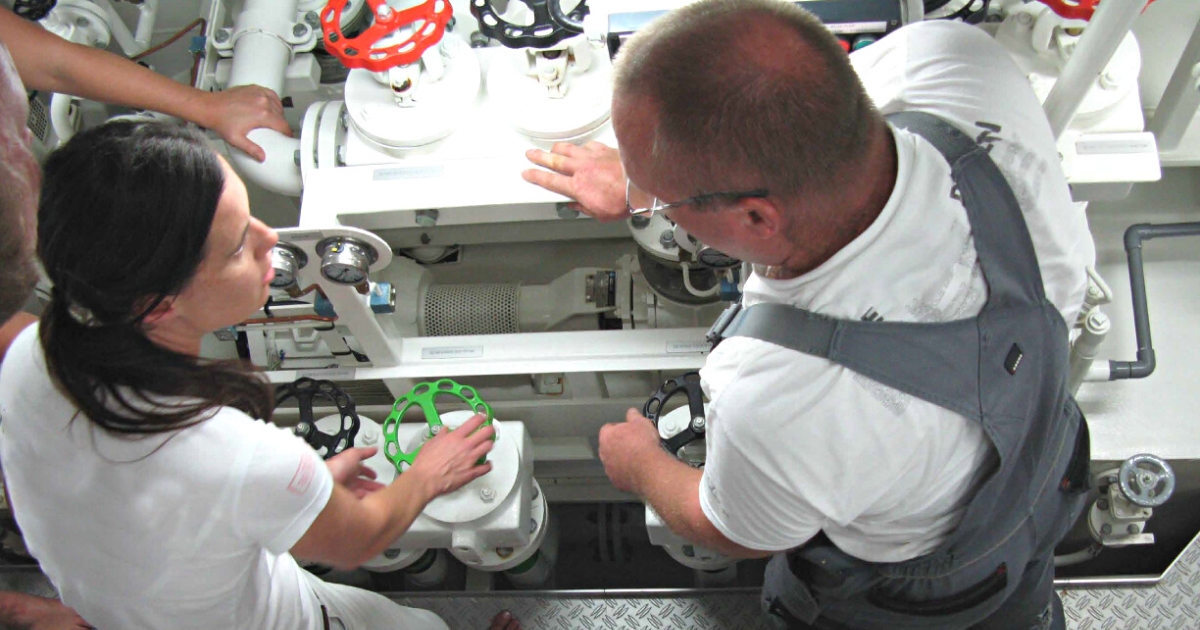
Chief engineer The chief engineer (often a sole engineer on smaller yachts), commands all engineering operations on board and will act as the senior advisor to the captain on all issues relating to the condition and serviceability of the engines, propulsion, ancillaries and interior systems.
Working closely with the captain to always ensure onboard safety, chief engineers are also responsible for maintaining compliance of the yacht’s systems and equipment with relevant laws and regulations to ensure that the vessel passes flag state and other surveys and inspections.
How do I rise up the ranks?
Progressing through the ranks requires you to apply for a certificate of competency (CoC) for each stage.
In order to qualify for the relevant CoC, there are various requirements for each role. These include attaining a certain amount of seagoing service, passing selected examinations (oral and written), and holding the applicable ancillary and safety course certificates. To discover the level of experience and exact qualifications required for each individual CoC, as well as other useful courses and qualifications to help you stand out from the crowd, visit the Academy by Ephemeris website and explore the engineering pathways .
A spokesperson from Academy by Ephemeris highlights: “The yachting industry is always in need of fantastic, tech savvy engineers. It is a fulfilling, challenging and stimulating career, and we are delighted to have helped scores of enthusiastic candidates to achieve their career goals by following the guidance laid out on our platform.”

Post your comment
You cannot post comments until you have logged in.
No one has commented on this page yet.
RSS feed for comments on this page | RSS feed for all comments
Search articles with keywords

OUR COURSES
Stcw basic training.

MPT IS THE MOST COMPLETE FULL SERVICE PRIVATE MARITIME SCHOOL IN THE COUNTRY
Over the years, we have had the privilege of training thousands of commercial mariners , yachting professionals and enthusiasts. This has enabled us to develop programs that are success oriented , with unbeatable pass rates, as well as cost and time efficient.

LEARN MORE ABOUT OUR SCHOOL
Ready to start your career .

Why take STCW Basic Training

Hurricane Ian Update, Tuesday, September 27, 2022

Hurricane Ian update - Monday, September 26

Updating your US National Endorsement Master’s License for STCW Compliance
1915 south andrews avenue, fort lauderdale, fl 33316, +1-954-525-1014 | +1-888-839-5025 (toll free), site map | privacy notice | cookie policy | accessibility notice, 1915 south andrews avenue, fort lauderdale, fl 33316 +1-954-525-1014 +1-888-839-5025 (toll free).

Renew Your Certificate
Recreational courses, superyacht courses, choose your location.
There is an IYT school on six continents. Begin training in the Mediterranean and finish in the Caribbean. Wherever you choose to be! IYT’s unique modular approach to yacht training has allowed the successful establishment of global partner schools offering a broad range of recreational and professional courses.

North America

South America

Learn to Sail
Become A Partner School
- Upgrade Your School
Government & Organization Approvals
- Recreational
- Privacy Policy & Terms Of Use
- Become a Partner School
- Register with IYT
- Find a School
- IYT E-Learning
- Certificate Renewal & Replacement
- Get Certified
- Recreational Training Course Progression
- IYT Passport
- Crossover Opportunities
- Course Progression
- Course Progression Interior
- Dive Boat Training
- Forms And Docs
- Instructor Training
- Personal Watercraft Operator
- Dinghy Sailing Programme
- IYT Try Sailing
- IYT Introductory Sailing Skills
- IYT Day Skipper / Crew Sail
- International Crew
- International Flotilla Skipper
- International Bareboat Skipper
- International Flotilla Skipper Sail – Catamaran
- International Bareboat Skipper Sail – Catamaran
- International Certificate of Competency (ICC Certificate)
- Powerboat Skipper
- Yachtmaster Coastal (Power or Sail)
- Yachtmaster Coastal Sail – Catamaran
- Yachtmaster Offshore (Power or Sail)
- Yachtmaster Offshore Sail – Catamaran
- Yachtmaster Ocean
- Patron de Yates (Yachtmaster Coastal Spanish edition)
- Marine Communications (VHF-SRC)
- Small Powerboat and Rib Master (MCA Recognised)
- IYT Commercial Tender License Course
- Weather Master
- Navigation Master
- Master of Yachts Coastal/Mate 200 Tons (Power or Sail)
- Master of Yachts Limited (Power or Sail)
- Master of Yachts Unlimited
- Superyacht Chef
- Superyacht Deck Crew Course
- Superyacht Hospitality Training
- Boat Engineer Course (SCV Code for Vessels Operating in the Caribbean)
- IYT-MSWI BoatMaster Course
- Become An IYT School
- Find A School
- Course Levels
- Instructor Qualifications
- Vessel Requirements
- Vessel and Facility Requirements
- Unauthorised Schools and Other Entities
- Shipping & Delivery
- Government Approvals
This site is part of the Informa Connect Division of Informa PLC
This site is operated by a business or businesses owned by Informa PLC and all copyright resides with them. Informa PLC's registered office is 5 Howick Place, London SW1P 1WG. Registered in England and Wales. Number 3099067.
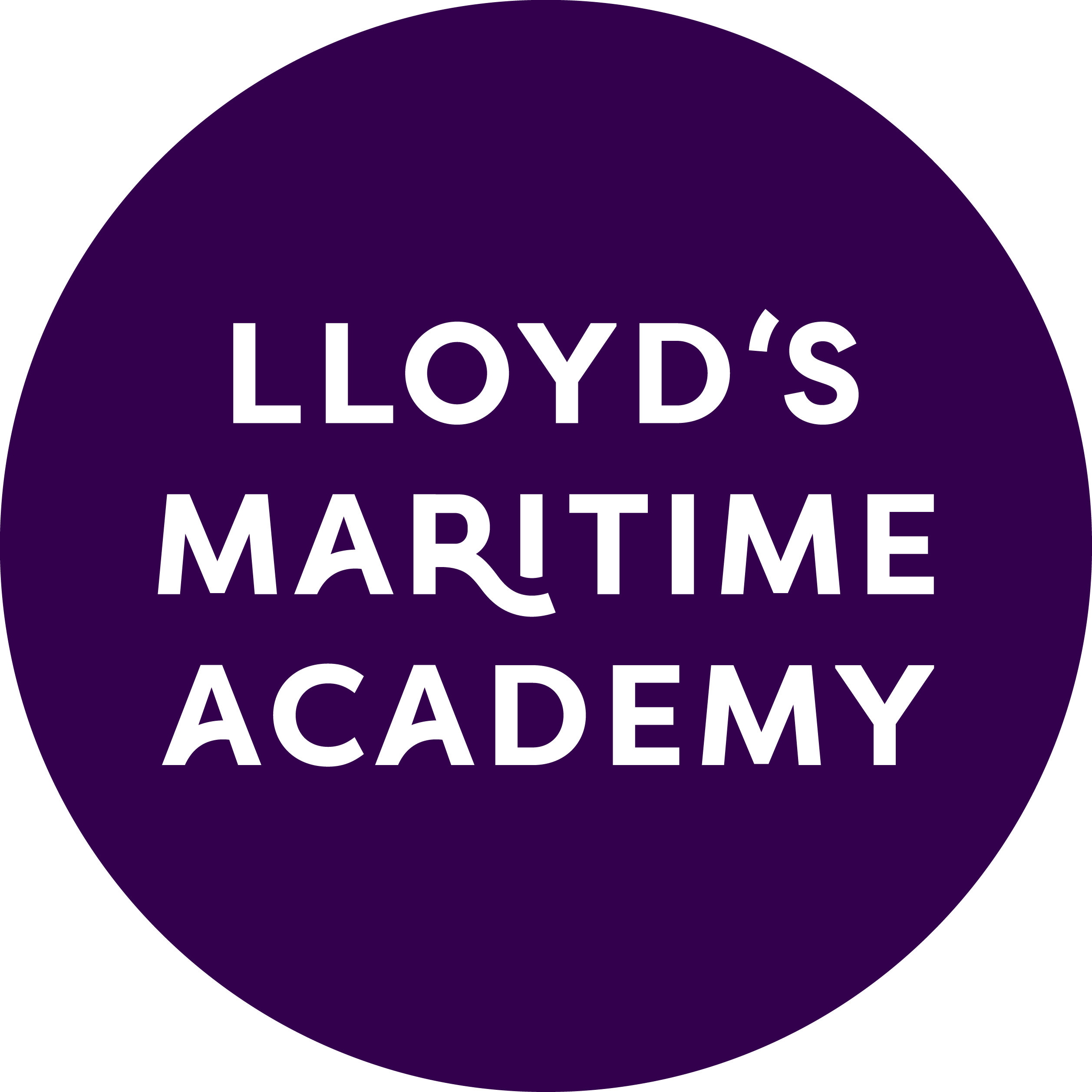
Sign up for our newsletter
Your maritime career, on course.
Providing a lifelong career pathway for maritime professionals
- Scheduled Digital 107
- On Demand Now 39
- Maritime Surveying & Technical 21
- Maritime Legal, Regulation & Insurance 18
- Ports & Container Shipping 15
- Management & Leadership in Maritime 15
- Crewing & Professional Development 12
- Salvage, Accident Prevention & Emergency Response 11
- Ship Manning & Operations 11
- Shipping Environment & Sustainability 11
- Offshore Energy/Oil & Gas 9
- Innovation & Digital Shipping 7
- March 2024 3
- April 2024 12
- May 2024 14
- Certificate 75
- North Kent College 23
- Middlesex University 3
- Liverpool John Moores University (LJMU) 2
- World Maritime University 1
Diploma in Marine Surveying
- Starting 23 Apr, 2024
- Scheduled Digital
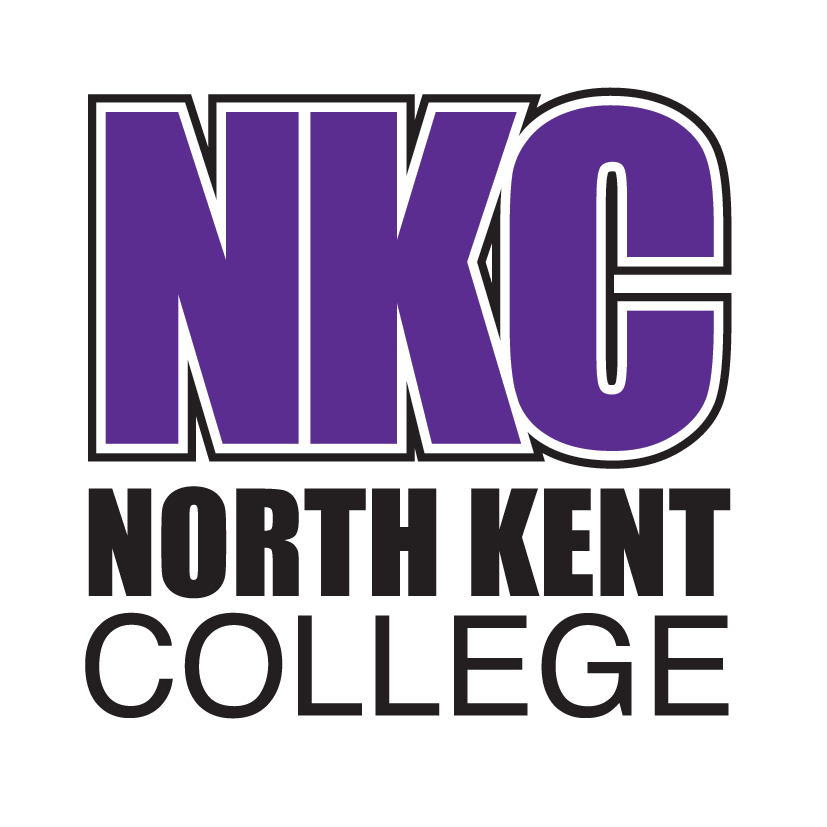
Diploma in Maritime Law
- Starting 25 Nov, 2024
Diploma in Heavy Lift and Project Cargo Operations
- Starting 19 Nov, 2024
Diploma in Ship Superintendency
- Starting 27 Mar, 2024
Certificate in Chartering
- Starting 2 Apr, 2024
- On Demand Now
Certificate in Maritime Law and Shipping Contracts
- Starting 24 Apr, 2024
Diploma in Marine Engineering
Pgdip/llm in international maritime law.
- Starting 16 Sep, 2024
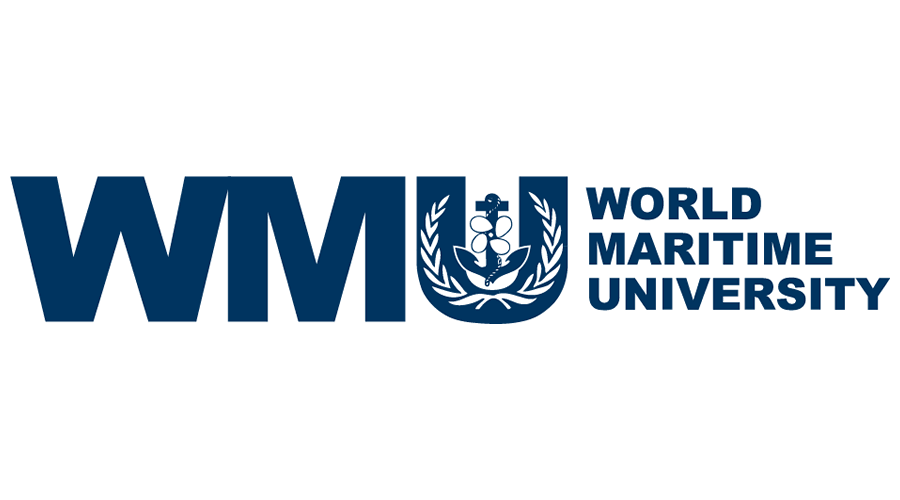
MSc Marine Operations Management (Continuation)
- Starting 11 Sep, 2023

Our Portfolios
Maritime management and leadership.
Our Management & Leadership Courses offer resources for both new and seasoned leaders to become more adept at developing employees, inspiring and supporting personnel needing to develop their expertise in the maritime and shipping industry.
Ship Manning and Operations
By enrolling onto a Shipping, Manning and Operations course, students will get the qualification necessary to ensure ships can cross oceans safely and the cargo placed in their care are delivered to their destinations in excellent conditions.
Maritime Safety and Environment
These distance learning courses have been carefully designed to ensure our graduates meet IMO environmental regulations and explore the technology required to create a responsible and sustainable future for shipping.
Ports and Logistics
Lloyd’s Maritime Academy Ports and Logistics portfolio examines the efficient, effective strategies and operations of forward-thinking networks in the logistics and supply chain, including supply chain management, logistics, and procurement
Maritime Law, Insurance and Contracts
Law, Insurance and Contracts is an important integral portfolio for Lloyd’s Maritime Academy - maritime law underpins all the many contracts involved in shipping, and the finance aspect caters for aspects relating to finance and economic issues.
Offshore Energy / Oil and Gas
The Offshore Energy / Oil & Gas portfolio examines topics in areas including the design, technology, commercial aspects, project management, operation and deployment of FPSOs through to guiding students into 2020 Sulphur regulations, compliance and enforcement.
Surveying and Technical
Our Surveying and Technical online courses explore the structural, technical, operational, legal and mechanical seaworthiness and safety of ocean-going vessels and small crafts.
Technology and Innovation
Stay at the forefront of technological development including digitalisation, artificial intelligence, autonomous shipping, big data and its manifestation and effects in the maritime industry.
Lloyd's Maritime Academy On Demand
Lloyd’s Maritime Academy’s new range of on-demand courses offer the ultimate flexibility in learning delivery
At Lloyd’s Maritime Academy, we are passionate about lifelong learning
Through our 3D learning model: Discover, Develop, Distinguish, we are confident we have a course that suits you and your organisation, whether via our online learning certificates, our academic partner programmes, or our dedicated in-company workshops.
Our Certificates offer you an opportunity to explore a wide range of specialised topics, whether you are looking for more grounding or specialisation, to advance your career, try out a new field, or pursue a long-time passion.
Our Diplomas are awarded by Further and Higher Education maritime partners and offer more structured content. Expect valuable insights and practical take-aways from renowned experts.
Distinguish
Our Postgraduate courses have been designed to help you become a more skilled and versatile industry professional. You will earn qualities like leadership, critical and analytical thinking, creativity, and communication.

MCA Approved Engine Course 1 ( AEC 1)
The First Step to Becoming a Superyacht Engineer under the MCA Training Framework
Read Information About The AEC 1 Course
Find an AEC 1 Training Centre
The MCA Approved Engine Course 1 is the first level of the MCA Engineering Officer training scheme. The overall aim is to provide Small Vessel engineers with the necessary knowledge, understanding, and proficiency to carry out safe and effective operations onboard.
The Approved Engine Course (AEC) is divided into two parts, the AEC I and AEC II . The previous AEC has been modified to AEC I . The AEC 2 is an enhanced continuation with the delivery of approximately 50% practical tasks and half (50%) theory. The AEC part I and part II will be termed the full AEC . This page will only cover elements of the AEC I . For details information please view the MCA AEC 1 Guidelines or speak to an appropriate training provider from the links at the bottom of the page.
AEC I Entry Prerequisites
The basic entry requirements for this course are:
- Minimum 18 years of age.
- There is no entry qualification specified to join this course.
Course Outcomes:
The learner will need to demonstrate competent knowledge of the following:
- General principles of the operation of the compression ignition engine and spark ignition engine
- General principles of the cycle of operation and constructional details of diesel engines
- General principles and purposes of air in the combustion process
- Safe operation of the cooling system, including maintenance of pumping components
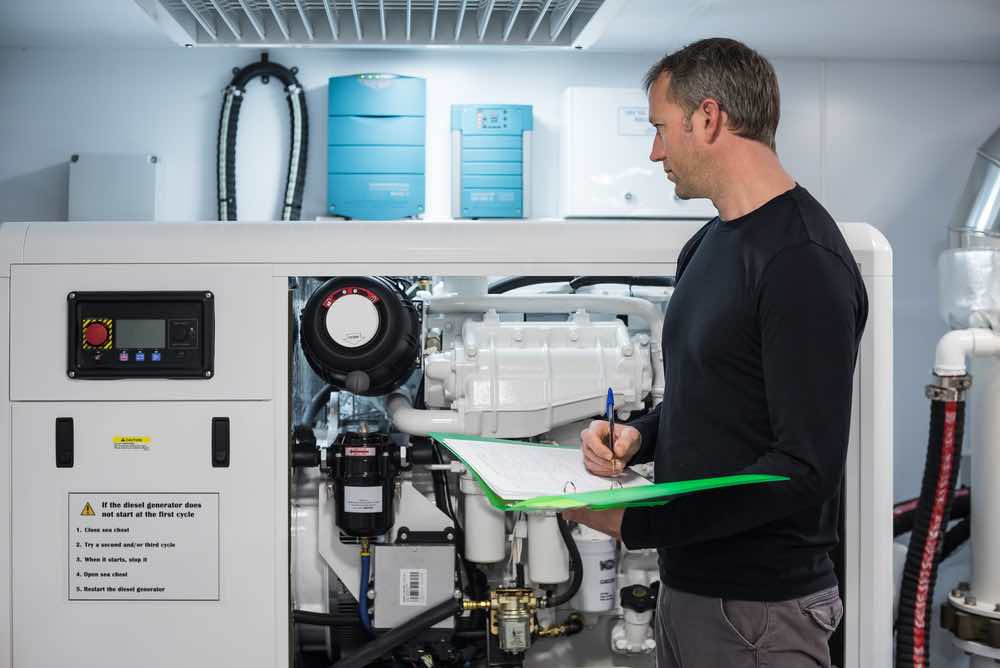
- Methods of maintaining the lubrication system and associated equipment
- General principles and operation of the electrical distribution system on-board, including engine electrical systems, batteries, and battery maintenance
- Power transmission arrangements, including gearbox, coupling, stern tube, and propellers
- Hull fittings, ship-side valves, protective coatings, and cathodic protection
- Legislative requirements of the pollution prevention and management of safe working practices, including principles of, risk assessment, fire prevention, control of entry into enclosed spaces, and fire-fighting techniques.
Certification:
If a student achieves the desired standard of competence through the ongoing practical exercises and written examination, a certificate will be issued by the training centre in the MCA-approved format.
The candidate’s ability is continuously assessed throughout the course and there is a one-hour written exam at the end. AEC 1 is a theory-based course.
Advantages of having an AEC
Qualifying experience for all the higher engineering qualifications is only recognized if the person holds an AEC, making it essential, should you wish to pursue the MCA training route. The AEC is also a valuable qualification for deck engineers and captains who require knowledge and understanding outside of their navigation and deck duties.
Find an AEC 1 Training Provider
France Antibes Cannes
South Africa Cape Town Durban Langebaan
Spain Palma de Mallorca

Thailand Phuket
United Kingdom England Ireland Isle of Wight Scotland
United States of America Fort Lauderdale
Username or Email Address *
Remember me Lost your password?
Username or Email
Get New Password

Study Online with the Maritime Training Academy
Enhance your career with a globally recognised Diploma or short course. Online learning allows you to study in your own time, at your own pace, from anywhere in the world.
Our Courses
Select one of the categories below to explore our portfolio of maritime diplomas, certificates and short courses.
Our portfolio of distance learning Diploma, Certificate, and Short Courses are managed and run by established professionals within the marine industry, we are constantly pushing back the boundaries of knowledge. Due to our rigorous academic standards our qualifications are highly respected internationally. Explore these courses here to find the one that is a perfect fit to develop your career.
How long do the courses take to complete? What's the difference between a Diploma and a Certificate? Read through our Frequently Asked Questions below to find out the answer.
Why Choose MTA?
Maritime training academy is an international leader in supplying distance-learning marine diplomas..
As part of the Maritime Services group, we offer an unrivalled combination of flexibility, support, expertise and industry affiliations.
Each year we help thousands of students to enhance their knowledge and further their careers.
While the nature of distance learning is independent study, we recognise the importance of support. Students can contact us at any time during their course for assistance and our team of industry experts are always on hand for advice.
We have over 50 industry experts writing, developing and advising on our course material. We truly believe that allowing students to tap into their expertise and knowledge is of the utmost importance to fulfil your dream career.
News & Blog
Keep up to date with the latest maritime training academy news.

The Role of a Superyacht Manager
Mar 4, 2024 | News
The world of superyachts conjures images of opulence, adventure, and the boundless expanse of the open sea. Yet behind the scenes of these floating palaces lies a complex web of logistics, maintenance, and hospitality management. At the helm of this intricate...

Palm Beach International Boat Show
Mar 1, 2024 | News
We are excited to get back into the swing of boat shows, and we’re kicking the 2024 calendar off with Palm Beach International Boat Show next month! Since 1982, the Palm Beach International Boat Show show has grown to occupy a dominant position in South Florida as...

Our Partnership with Wilsonhalligan
Feb 23, 2024 | News
At the Maritime Training Academy, we are committed to equipping our students with the skills and knowledge necessary to excel in the maritime industry. We understand the importance of not only providing high-level education but also facilitating avenues for career...
Supported By

Sign-up to receive email updates
- Brokerage New Construction How to Buy How to Sell
- Yacht Fleet Yacht Catalog Charter Marketing Destination Guides
- Financial Services Payroll & Accounting Payroll Service Process Logistical Support Admin Services Crew Admin
- Job Descriptions Crew FAQ
- About Sitemap
Engineering License Changes
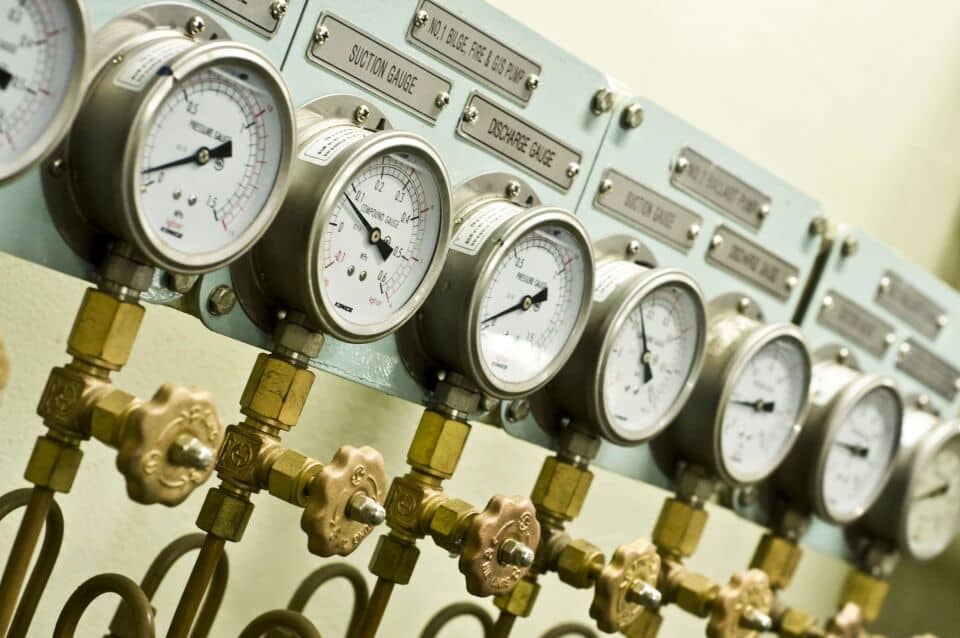
The MCA has restructured the engineering certifications. The MEOL course has been done away with, and the AEC course made mandatory and more thorough. Luxury Yacht Group explains all these changes, what engineers progressing through the ranks can do now, and how Y ticket holders can convert their licenses over to the structure.
"Holders of MCA Y licenses will have until 2021 to convert their current certificates to the Small Vessel Engineering license. Crew members taking Y3/Y2/Y1 oral examinations between now and then can request to be examined for a Small Vessel Engineering license instead of a Y3/Y2/Y1 license", says Ann Aylesworth, Manager of Student Services at MPT.
One of the main changes to the structure of the engineering courses will be the abolishment of the Marine Engine Operator License (MEOL), and new changes to the Approved Engine Course (AEC). The MEOL was a skills test that many felt was lacking in credibility.
The AEC course will now be split into two parts, namely Part I and Part II. The existing AEC will become AEC part I. The AEC part II will be a more in-depth course, with half of it focusing on practical tasks, and the other half theory. The two parts together will be known as the full AEC.
An exemption from the AEC will be available under the Accreditation of Prior Learning (APL) carried out by an MCA-approved training provider. They will compare your previous training and experience against the new syllabus and determine whether an exemption can be granted.
A conversion of existing Certificate of Competency (CoC) to Small Vessels (SV) CoC will be as follows, as taken from the MCA's website:
Certificate of Competency
Conversion a1.
If you hold Y4 CoC, to obtain a SV Second Engineer less than 9,000 kW, less than 3,000 GT, unlimited area CoC you must:
- Complete six months sea going service on yachts of at least 350 kW while holding Y4 CoC OR pass the MCA oral examination for Second Engineer Officers on Small Vessels less than 9,000 kW, less than 3,000 GT, unlimited area, III/2 MCA oral examination.
- Hold the applicable ancillary and safety course certificates listed in Certificate of Competency table (above).
- Hold a valid ENG1 (medical fitness certificate) or accepted equivalent.
Conversion A2
If you hold Y4 CoC, to obtain a SV Chief Engineer less than 3,000 kW, less than 500 GT, unlimited area CoC, you must:
- Complete six months seagoing service on yachts of at least 350 kW while holding a Y4 CoC.
- Successfully complete the MCA-approved module and pass the corresponding written examination for Chief Engineer Statutory and Operational Requirements.
- Hold the applicable ancillary and safety course certificates listed in the Certificate of Competency table (above).
- Pass the MCA oral examination for Chief Engineer on Small Vessels less than 3,000 kW, less than 500 GT, unlimited area, III/2.
Conversion A3
If you hold Y4 CoC, to obtain a SV Chief Engineer less than 9,000 kW, less than 3,000 GT CoC, unlimited area, you must:
- While holding a Y4 Certificate of Competency complete six months seagoing service on a yacht of at least 350 kW which includes a minimum of three months service on yacht of 750 kW or more in power.
- Chief Engineer Statutory and Operational Requirements.
- Applied Marine Engineering.
- General Engineering Science I & II.
- Pass the MCA oral examination for Chief Engineer on Small Vessels less than 9,000 kW, less than 3,000 GT, unlimited area, III/2.
Conversion B
If you hold Y3 CoC, to obtain a SV Chief Engineer less than 3,000 kW, less than 500 GT, unlimited area Coc, you must:
Conversion C
If you hold Y3 CoC, to obtain a SV Chief Engineer less than 9,000 kW, less than 3,000 GT CoC, unlimited area, you must:
- Complete six months seagoing service while holding Y4 CoC, or 3 months seagoing service while holding Y3 CoC. Six months of this seagoing service must be completed on yachts of at least 750 kW and the remainder on yachts of 350 kW or more in power.
- SQA General Engineering Science I and II
- SQA Applied Marine Engineering
- Hold the applicable ancillary and safety course certificated listed in the Certificate of Competency table (above).
Conversion D
If you hold Y2 CoC, to obtain a SV Chief Engineer less than 9,000 kW, less than 3,000 GT CoC, unlimited area you must:
- Complete three months seagoing service on yacht of at least 750 kW while holding Y2 Certificate of Competency.
Conversion E
If you hold Y1 CoC, to obtain a SV Chief Engineer less than 9,000 kW, less than 3,000 GT CoC, unlimited area you must:
Conversion F1
If you hold an EOOW unlimited, III/1 CoC, to obtain a SV Second Engineer less than 9,000 kW, less than 3,000 GT CoC, unlimited area you must:
- Hold the applicable ancillary and safety course certificate listed in the Certificate of Competency table (above).
Conversion F2
If you hold an EOOW unlimited, III/1 CoC, to obtain a SV Chief Engineer less than 3,000 kW, less than 500 GT CoC, unlimited area you must:
- Complete six months seagoing service while holding EOOQ III/1 CoC on vessel of at least 350 kW.
- Auxiliary Equipment
- Applied Marine Engineering
- Hold a valid ENG1 (medical fitness certificate) or accepted equivalent
Conversion F3
- Complete 12 months seagoing service whilst holding EOOW CoC on vessels of at least 750 kW
- General Engineering Science I & II
- Chief Engineer Statutory and Operational Requirements
Conversion G1
If you hold a Second Engineer less than 3,000 kW, unlimited area CoC, to obtain a SV Chief Engineer less than 3,000 kW, less than 500 GT, unlimited area CoC and Second Engineer less than 9,000 kW, less than 3,000 GT CoC, unlimited CoC, you must:
Conversion G2
If you hold a Second Engineer less than 3,000 kW, unlimited area CoC, to obtain a SV Chief Engineer less than 9,000 kW, less than 3,000 GT CoC, unlimited area you must:
- Have completed eight months seagoing service in full charge of the watch on vessels of at least 750 kW
Conversion H
If you hold a Chief Engineer less than 3,000 kW, unlimited area CoC, to obtain a SV Chief Engineer less than 9,000 kW, less than 3,000 GT CoC, unlimited area, you must:
Conversion I
If you hold a Second Engineer unlimited, III/2 CoC, to obtain a SV Chief Engineer less than 3,000 kW, less than 500 GT CoC, unlimited area, you must:
Conversion J
If you hold a Second Engineer unlimited, III/2 CoC, to obtain a SV Chief Engineer less than 9,000 kW, less than 3,000 GT CoC, unlimited area, you must:
The information above is taken directly from the Maritime Coastguard Agency's Marine Information Note, and all parts relevant to superyacht crew have been highlighted. The changes are positive, allowing Certificates of Competency to be interchangeable between licensing categories, enabling engineers to climb through the ranks more quickly.
Additionally, the MCA is allowing some sea service requirement time (up to 25% of it) to be counted at the dock, on anchor or in the ship yard. Days underway at sea will now be counted as 1.5 days of sea service.
It is recommended that engineering crew start the conversation about these changes with their training schools to ensure that any courses they take going forward complies with the new structure and licensing program.
For any questions, please feel free to contact Luxury Yacht Group at [email protected]

A Day in the Life Series – Chief Stewardess
For a yacht to run smoothly, it requires many working parts, and the interior department is a large component of this. The chief stewardess oversees this department and makes sure all the stewardesses onboard know what their tasks and responsibilities are. The interior department is largely in charge of the guest services whilst they are onboard, and responsible for interior maintenance of the yacht when they are not.
18 Dec 2017
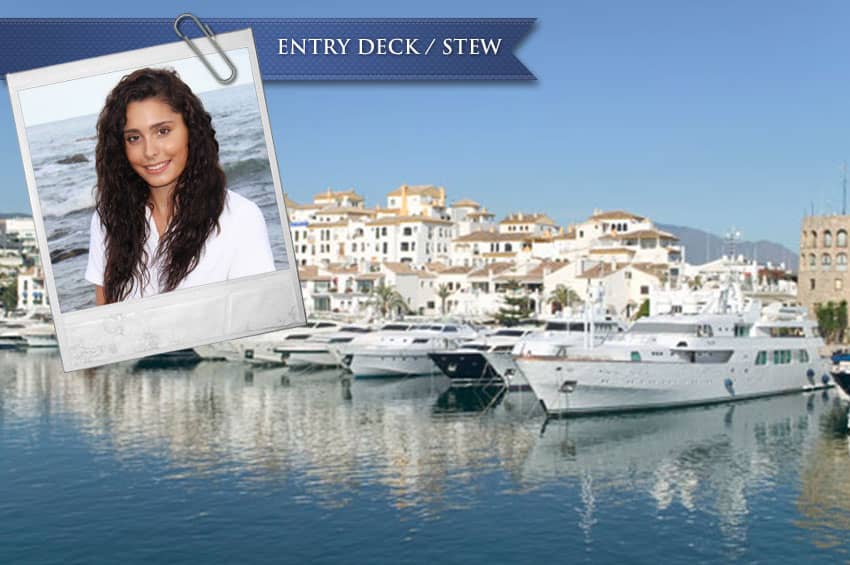
A Day in the Life Of Series - Entry Stewardess
Joining the yachting industry is an exciting and daunting undertaking. In this two part interview we speak with Melanie about why she decided to join the superyacht industry, what her hopes and goals are, and what she has learnt so far as an entry level stewardess.
29 Nov 2017
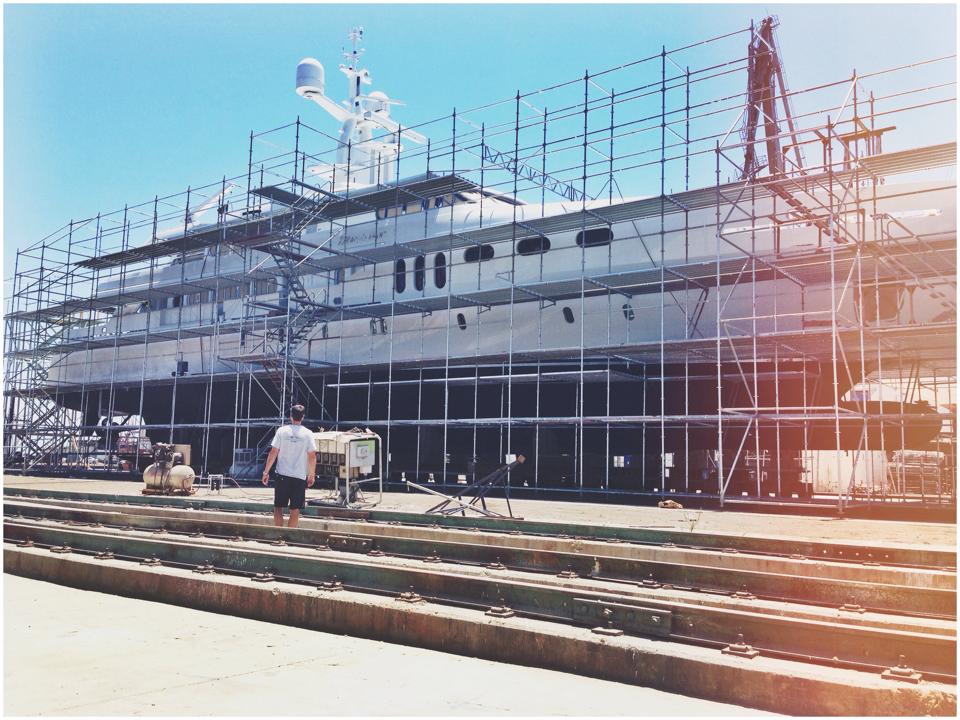
The Confessions of a Recovering Yachtie
Making the decision to leave the yachting industry and put down roots ashore is one of the hardest things us crew members face at some stage in our careers. Men and women who share their experiences, strengths and hopes with each other, may solve their common problem and help each other recover from yachting to live a regular life on land. These are my confessions.
11 Aug 2017

By Wilsonhalligan Yacht Recruitment 16 May 2017
How To Become A Yacht Engineer – Qualifications and Requirements
If you are looking for a career as a yacht engineer, we’ve compiled a breakdown of the qualifications and requirements needed to start out, insight into the job day-to-day and how to effectively land your dream position. what does a yacht engineer do ….
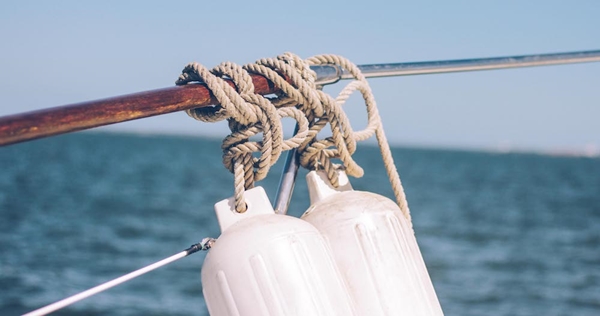
If you are looking for a career as a yacht engineer, we’ve compiled a breakdown of the qualifications and requirements needed to start out, insight into the job day-to-day and how to effectively land your dream position. What Does a Yacht Engineer do?
Depending on type, size and usage of the yacht, the Engineering department (be that a Sole Engineer or a department of 6 or more Engineers) are responsible for the operation, maintenance and repair of all mechanical, electrical, electronic, hydraulic, pneumatic and in some cases, structural systems and appendages found on board a modern yacht and superyacht.
Skills Needed to be a Successful Yacht Engineer
The role requires a keen eye for planning and organisation, as planned maintenance (carrying out preventative and explorative maintenance before failures occur) is a very important aspect in modern marine engineering. Skills in project management, resource allocation and time management are very desirable in addition to extensive and diverse technical ability. Many yachts employ software programs to aid a methodical approach to planned and preventative maintenance and to record failures and repairs as they occur as well as keeping an accurate inventory of spares held on board. Being able to efficiently use such software programs efficiently would be highly advantageous. Examples of these asset management programs are AMOS and IDEA .
Challenges as an Engineer Onboard a Yacht
Engineering on a superyacht has particular challenges as some yachts (particularly charter yachts) can be very busy, meaning a very fast paced and demanding environment. High expectations from owners and guests in regards to service and entertainment also puts a keen onus on engineering departments to keep all systems working to minimise or eliminate down time and negative impacts on the itinerary. Of course, when the yacht is at sea, many of these systems are safety critical and break downs and failures offshore bring a whole new set of challenges and risks.
Which qualifications do I need to get in to superyacht engineering?
There are really two main entry routes in to yacht and superyacht engineering which follow two distinct certification pathways – entering from commercial shipping, or working through yacht-based certification routes.
Commercial Shipping Route of Training for Yacht Engineering
The Commercial Shipping route most commonly begins with a sponsored cadetship with a shipping company working in partnership with maritime training provider. Candidates must apply to one of a number of cadetship schemes and if accepted will undertake usually 3 years of study and work experience on the sponsoring companies’ vessels, culminating very often in the Officer of the Watch (Engineering) or ‘EOOW’ ticket and usually either an HND or BSc Degree in Marine Engineering or similar.
Once the EOOW certificate is in hand, candidates can be considered suitably qualified and experienced for junior engineering officer roles on large yachts. A common first yachting job for EOOW qualified candidates is 3rdEngineer. The main advantage of a cadetship is that seatime is gained quickly and on vessels over 3000 GT, allows for a ticket which is ‘unlimited’ by tonnage as all yacht engineering certificates are. This opens the door to working on the world’s largest mega and superyachts.
Also, the sponsoring company pays for all courses and examinations which would be extremely expensive if self-sponsored, and very often a small training bursary is paid on top (some as much as €11,000 / year). The biggest disadvantage is that candidates who ultimately want to work on superyachts will have to commit to different types of vessel for the duration of the cadetship – these are likely to be chemical tankers or containerships, but most of the large luxury cruise ship companies also offer cadetships which is in some ways closer to the yachting industry. One facilitator of maritime cadetships is the Warsash Maritime Academy – see here .
Yacht Certification Route of Training for Engineering
This route is made up of 6 key certificates:
The Approved Engine Course (AEC) – often seen as the base-minimum for superyacht engineers who wish to work on yachts over 24m LOA. Usually a 4-day course covering the theory of compression-ignition (diesel) engines and includes a large amount of practical workshops. The full syllabus can be found here . One common provider of AEC courses is Bluewater Yachting in Antibes – see here .
The Marine Engine Operators Licence (MEOL) – This is the first certificate in the yacht route that requires sea service, specific shore based learning and an oral exam. Further details can be found in MSN 1859 here .
Y4 Engineer – The first of what is commonly referred to as the ‘Y Tickets’ – Y4 allows engineers to work as Chief Engineer on yachts between 200 and 500GT and up to 1500Kw in propulsive power.
Y3 Engineer – Allows engineers to work as Chief Engineer on yachts up to 3000GT and up to 3000KW in propulsive power.
Y2 Engineer – Allows engineers to work as Chief Engineer on yachts up to 3000GT and up to 6000KW in propulsive power.
Y1 Engineer – Allows engineers to work as Chief Engineer on yachts up to 3000GT and up to 9000KW in propulsive power.
The Maritime and Coastguard Agency have simplified the Y ticket structure however, and page 19 of MIN 524 provides a simple conversion table from Y tickets to the new standard – Small Vessel (or SV) tickets.
Some course providers are now offering yachting cadetships – one example is this one provided by the UKSA in Cowes on the Isle of Wight –see more here .
How are Engineering Departments Structured on Yachts?
Engineering departments vary widely according to the type, size and usage of the yacht in question, but most large yachts will have some or all of the following roles on board:
Chief Engineer (or Sole Engineer on smaller yachts with only one engineer) The Chief Engineer is in overall command of all Engineering operations on board and is the senior advisor to the Captain on all matters related to the condition and serviceability of the yachts engines, propulsion, ancillaries and hotel systems. Although Captains always retain supreme responsibility for the safety of the vessel, all the best captains will work very closely with the Chief Engineer and take heed of any advice and requests they make – after all, they are highly trained, experienced and knowledgeable subject matter experts. Chief Engineers are responsible for ensuring that the Yacht is in all respects compliant with the relevant laws and regulations governing the serviceability of the yachts systems and equipment. They are pivotal in ensuring the yacht passes any relevant flag state, port state or P&I club surveys and inspections.
1st Engineer Some of the very largest yachts afloat employ a 1st Engineer similar to those employed on Cruise Ships. If a 1stEngineer is employed, they will take operational (day-to-day) command of the engineering team, supervising engineering tasks and allocating work as appropriate. This allows the Chief Engineer to concentrate on the large amount of paperwork and business management necessary on board a very large yacht.
2nd Engineer The more common understudy to the Chief Engineer, the 2nd Engineer often has responsibility for Engine Room maintenance and will take on many of the more challenging maintenance and repair tasks as required. The 2ndEngineer acts as a supervisor for more junior crew, and in some cases will be able to deputise for the Chief Engineer if required.
3rd Engineer The 3rd Engineer will have specific duties, which may include maintenance of the ship’s lifeboats, tenders, jet skis, toys and deck equipment like winches, davits and hatchways. Very often 3rds are responsible for interior maintenance. Again, areas of responsibility vary from yacht to yacht. 3rd Engineers are often focused on gaining the requisite experience and ‘seatime’ to progress to 2nd Engineer.
4th Engineer The most junior engineering officer on board, the 4th is very often new to Marine Engineering and is learning the trade. 4th Engineers are often engaged in structured learning programs, or at least splitting their time between phases at sea learning on the job with phases ashore attending courses. Again, this can vary widely across the industry.
Motorman A junior, but important role found almost exclusively on large yachts in excess of around 100m, the motorman (not gender-specific!) is responsible for the operation and basic maintenance of the yachts main engines and engine room systems. They may assist in starting and stopping large engines and generators, operating switch panels under the supervision of an officer or senior engineer and reporting anything unusual. Engine room cleanliness and order will be an important part of the role.
Wiper / Oiler On the largest yachts, especially those operating medium speed diesels or older conventional ship propulsion technology, a wiper and oiler may be employed in addition to the above with a focused role keeping engines and machinery spaces clean, and keeping greased bearings fed or keeping open rockers oiled etc. An ability to access confined spaces is often useful, and a keen eye for cleanliness in bilges and bunded tanks etc is often a must.
How To Find a Job as a Superyacht Engineer
Once you have the relevant qualifications, then comes the time to start looking for your first position. Of course, word of mouth and personal connections made through training are a fantastic way to gain knowledge on current positions available however, also consider the following:
Dockwalking – travel to one of the main superyacht hubs like Palma, Antibes or La Ciotet and walk the docks asking yachts if they need engineering crew. Make sure you take a proper CV, written references and go well presented. Be polite and be prepared for a good deal of face-to-face rejection, however don’t take it personally.
Use a reputable crew agent such as wilsonhalligan who is MLC 2006 compliant, vastly experienced and a well respected crew recruitment agency in the industry who does the dock walking for you!
Check out our latest jobs here and we often post featured engineering jobs on our Facebook page – like our page here to keep up with the latest jobs and industry news.
View company profile
The entity that submits this press release to SuperyachtNews.com hereby accepts sole responsibility for the facts, accuracy and completeness of the content. All content and mediums submitted are an acknowledgement of the suitability for publication. SuperyachtNews.com accepts no liability or responsibility for any inaccuracies or errors made by the submitter in this regard.
Click here to become part of The Superyacht Group community, and join us in our mission to make this industry accessible to all, and prosperous for the long-term. We are offering access to the superyacht industry’s most comprehensive and longstanding archive of business-critical information, as well as a comprehensive, real-time superyacht fleet database, for just £10 per month, because we are One Industry with One Mission. Sign up here .
Sign up to the SuperyachtNews Bulletin
Receive unrivalled market intelligence, weekly headlines and the most relevant and insightful journalism directly to your inbox.
Sign up to the SuperyachtNews Bulletin
The superyachtnews app.

Follow us on
Media Pack Request
Please select exactly what you would like to receive from us by ticking the boxes below:
SuperyachtNews.com
Approved Engine Course 1
AEC might well have been called the ’Assistant Engineers Course’, it is a requirement for holding this relatively new post. The AEC is aimed at giving a wide and general appreciation of basic marine diesel mechanics and electrics along with an understanding of the chief engineer’s responsibilities. Specifically the course covers: compression ignition engines (general principles), the cycle of operation and construction of engines. It describes fuel systems, the role of air in the combustion process, cooling and lubrication systems, engine electrical systems, power transmission and hull fittings. Other areas include safe working practices, pollution prevention and bottled gas installations. The course is the first rung on the engineering career ladder for those with no formal marine engineering or craft training. It is of interest to crew members from other departments who wish to enhance their employment prospects by being able to fill the Assistant Engineer position or who wish simply to deepen their engineering knowledge. Small boat private owners may also find this course useful. This course is fully redeemable with your ONE Account vouchers.
We provide this yacht training course in Palma & Antibes.
Written examination externally marked on the final day. If failed, 2 resits allowed in the following 6 months. Certificates will only be issued to successful candidates once exams have been marked.
- I have a sufficient level of spoken and written English to understand the course content and to pass any verbal or written assessments.

IMAGES
COMMENTS
Yachting Engineering programmes. Our Yacht Engineering courses will give you the internationally recognised skills and qualifications you need to start your career as a yacht engineer, providing an understanding of engineering disciplines, as well as the hands-on skills you'll need. Our programmes include:
Junior / Assistant Engineer: An STCW: EVERY crew member onboard must hold a valid STCW; An ENG1 Medical Certificate: EVERY crew member onboard must hold a valid ENG1; AEC 1: The Approved Engine Course 1 is an entry-level qualification for the MCA engineering training schedule and is regarded as the first step on the ladder. It is generally a 5-day / 30-hour course that aims to provide ...
Skills needed to be a successful Yacht Engineer: The role requires a keen eye for planning and organisation. Planned maintenance (carrying out preventative and explorative maintenance before failures occur) is a very important aspect in modern marine engineering. Skills in project management, resource allocation and time management are very ...
Yacht Certification Route of Training for Engineering. This route is made up of 6 key certificates: The Approved Engine Course (AEC) - often seen as the base-minimum for superyacht engineers who wish to work on yachts over 24m LOA. Usually a 4-day course covering the theory of compression-ignition (diesel) engines and includes a large amount ...
The Maritime and Coastguard Agency (MCA), have set out the basic course progression you will need to follow in order to work your way up from a Junior Engineer, to Chief Engineer onboard. This involves completing the AEC, MEOL and Yacht 4, 3, 2 and 1 qualifications. The qualifications you require include: A mechanical, diesel or electrical ...
Superyacht Training Academy. Cape Town, South Africa. The Superyacht Training Academy, Cape Town, is an elite maritime Institute providing Internationally recognised training for professional yacht crew. We pride ourselves in releasing crew into the Superyacht industry who are confident, competent, and responsible.
Dive into the world of yacht engineering with this 10 Best Yacht Engineering Courses. Explore ship design, propulsion systems, electrical engineering on boats, and navigation principles. Learn from industry experts, engage in hands-on simulations, and gain the skills needed to design, build, and navigate yachts.
There are two common routes for becoming a superyacht engineer. Firstly, you can enroll in the courses set out by the Maritime and Coastguard Agency (MCA) and work your way through them from the bottom up. These include the Approved Engine Course (AEC), the Marine Engine Operator License (MEOL), and the Yacht 4, 3, 2 and 1 qualifications (with ...
Explore our interactive online yacht training courses, designed for convenience and effectiveness. Accessible anytime, anywhere, our e-learning platform will help you advance your skills from wherever you are in the world. ... Engineering . KEEP YACHTS RUNNING SMOOTHLY . Yachts require skilled engineers to maintain their complex systems and ...
MPT IS THE MOST COMPLETE FULL SERVICE PRIVATE MARITIME SCHOOL IN THE COUNTRY. Over the years, we have had the privilege of training thousands of commercial mariners, yachting professionals and enthusiasts. This has enabled us to develop programs that are success oriented, with unbeatable pass rates, as well as cost and time efficient.. LEARN MORE ABOUT OUR SCHOOL
IYT operates more boating courses with more government approvals through more schools, in more countries and in more languages than any other boating organization in the world. We are proudly ISO 9001:2015 approved. International Yacht Training Worldwide is the global leader in International Certificate of Competence, Superyacht Crew training ...
At Lloyd's Maritime Academy, we are passionate about lifelong learning. Through our 3D learning model: Discover, Develop, Distinguish, we are confident we have a course that suits you and your organisation, whether via our online learning certificates, our academic partner programmes, or our dedicated in-company workshops.
Yacht Crew Training. Yacht owners and captains require well trained crew. Some certificates (such as STCW) are mandatory for everyone, others are mandatory for certain positions or may improve your chances of getting hired. ... Engineering Crew Training. Culinary Crew Training. General Crew Training. Yacht Deck Courses. Yacht Rating (1 ...
The Approved Engine Course (AEC) is divided into two parts, the AEC I and AEC II. The previous AEC has been modified to AEC I. The AEC 2 is an enhanced continuation with the delivery of approximately 50% practical tasks and half (50%) theory. The AEC part I and part II will be termed the full AEC. This page will only cover elements of the AEC I.
Maritime Training Academy is an international leader in supplying distance-learning marine diplomas. As part of the Maritime Services group, we offer an unrivalled combination of flexibility, support, expertise and industry affiliations. Each year we help thousands of students to enhance their knowledge and further their careers.
SQA Applied Marine Engineering; Hold the applicable ancillary and safety course certificated listed in the Certificate of Competency table (above). Hold a valid ENG1 (medical fitness certificate) or accepted equivalent. Pass the MCA oral examination for Chief Engineer on Small Vessels less than 9,000 kW, less than 3,000 GT, unlimited area, III/2.
The most junior engineering officer on board, the 4th is very often new to Marine Engineering and is learning the trade. 4th Engineers are often engaged in structured learning programs, or at least splitting their time between phases at sea learning on the job with phases ashore attending courses. Again, this can vary widely across the industry.
04 November 2024. Antibes. €1200. Places available. Book now. <p>AEC might well have been called the 'Assistant Engineers Course', it is a requirement for holding this relatively new post. The AEC is aimed at giving a wide and general appreciation of basic marine diesel mechanics and electrics along with an understanding of the chief ...
Policy Statements. Marine Corps Engineer School (MCES) trains entry-level Marines and develops engineer leaders while providing explosive hazards and improvised threat training, capabilities analysis and development, doctrine development and maintenance, and training and education enhancement in order to support proponents and the Marine Air ...
The history of the university is unique: long-time mergers of universities of technological, humanitarian and creative orientation culminated in the creation of Moscow Information Technology University - Moscow Institute of Architecture and Civil Engineering (MITU-MASI). The university has been proudly bearing this name since October 11, 2016.
Find your perfect Course! Find my course. About Moscow City University. Founded in 1995, Moscow City University offers more than 300 degree programs and has a proven record of attracting talented students from around the world. Former and current students have come to study here from China, Germany, Japan, Great Britain and many more countries.
Buy tickets. River Cruise aboard a River Palace Yacht from City-Expocentre (International Exhibition) HIT SALES. Daily, from April 27, 2024. Departure from the berth City-Expocentre (m. Vystavochnaya), mooring place "A". Cruise duration 3 hours. We invite you on a river cruise aboard a premium class panoramic yacht starting from the main Moscow ...
Many years of experience in training yacht captains and organizing yacht and adventure tours of any complexity. Individual and creative approach to all tasks. I love the sea and sails very much. And I want to bring love, goodness, and light into our world. | Learn more about Tatiana Kaverina's work experience, education, connections & more by visiting their profile on LinkedIn